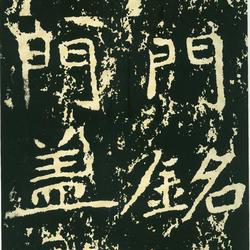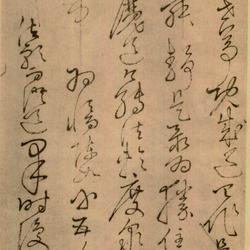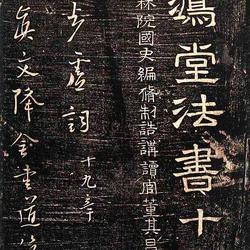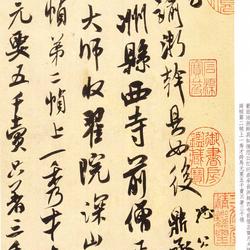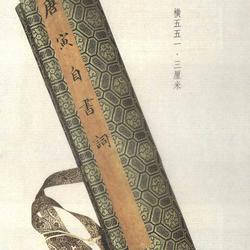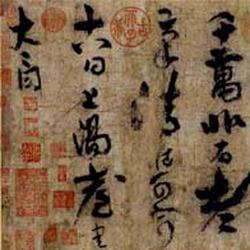Guo Quan, a little-known person who lived during the reign of Emperor Taizong in the early Tang Dynasty (seventh century). Zhongjing was born in Zhenguan (627-649). Gong Shu, Dumu's "Yu Yi Bian" in the Ming Dynasty said that "his calligraphy is sophisticated, even and almost charming". Zhan Jingfeng of the Ming Dynasty mentioned in "Dongtu Xuanlan": "In the Tang Zhenguan period, the Jing Shengguo interpretation was written with the word "Xu" on the top of the finger, and the "Law of Shanjian" was written on hard yellow paper." This kind of scripture written by him is the only one seen today. . At the end of the volume of "Shan Jian Lv", Xu*, a Ming Dynasty scholar, mentioned in his postscript that the "Lanting Hu Preface" kept in his home was a copy of Chu people's Guo Quan.
Most of the scriptures written by people in the Tang Dynasty did not include famous names. Some of them had famous names but were not celebrities. Therefore, calligraphers did not pay enough attention to them in the past. In fact, due to the emphasis on calligraphy in the Tang Dynasty, especially in the middle and prosperous Tang Dynasty, the level of calligraphy for writing scriptures was generally very high. "The Law of Good Views" describes Sakyamuni's propagation of Buddhism. At the end of the volume, it is written "Volume of Good Views" at the top, and at the bottom it is signed "Written by the State on December 10, the 22nd year of Zhenguan". The scriptures in this volume are neat and tidy, with even structure and strong stipples, flexible and skillful brushwork, and appropriate weight. The whole article is written in one go, with superb attainments.
This volume is on black silk paper in small regular script. 275 lines, 17 characters per line, 22.6 cm long and 468.8 cm wide, collected by the Palace Museum. The calligraphy strokes are even and vigorous, and the structure is smooth and elegant. It can be seen that the calligraphy in it is inherited from Wang Xizhi's "Le Yi Lun", "Huang Ting Jing" and other small regular scripts, and it is closer to the neat and elegant style of regular script between Chen and Sui Dynasties. Initiating the calligraphy style of the early Tang Dynasty. Most of the regular scripts in the early Tang Dynasty were written on stele, and it was difficult to preserve the original writing style after the calligraphy was engraved. Therefore, Mi Fu in the Song Dynasty emphasized the need to read more ink when practicing calligraphy. "Law of Shanjian" provides a rare model for those who learn small regular script. At the back of the volume, there are nine inscriptions and postscripts by Zhao Mengfu, Feng Zizhen, Ni Zan, Ming Xing Dong and Dong Qichang. Dong Qichang and other nine inscriptions are also ink by famous calligraphers.
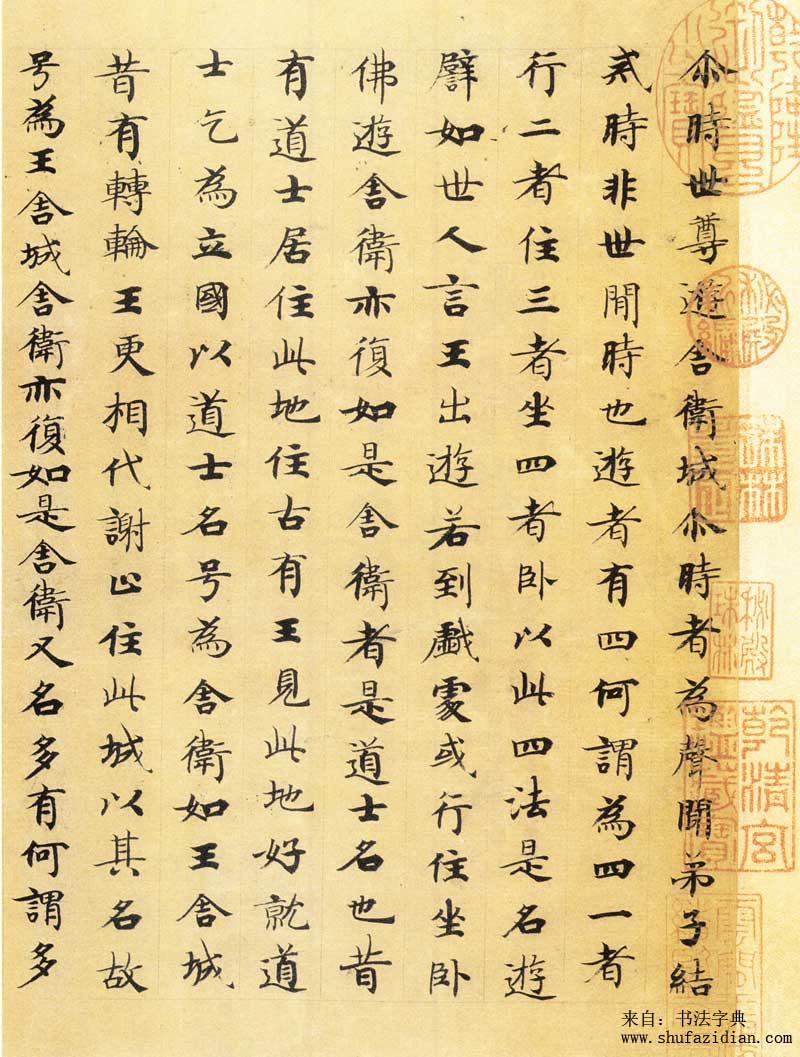
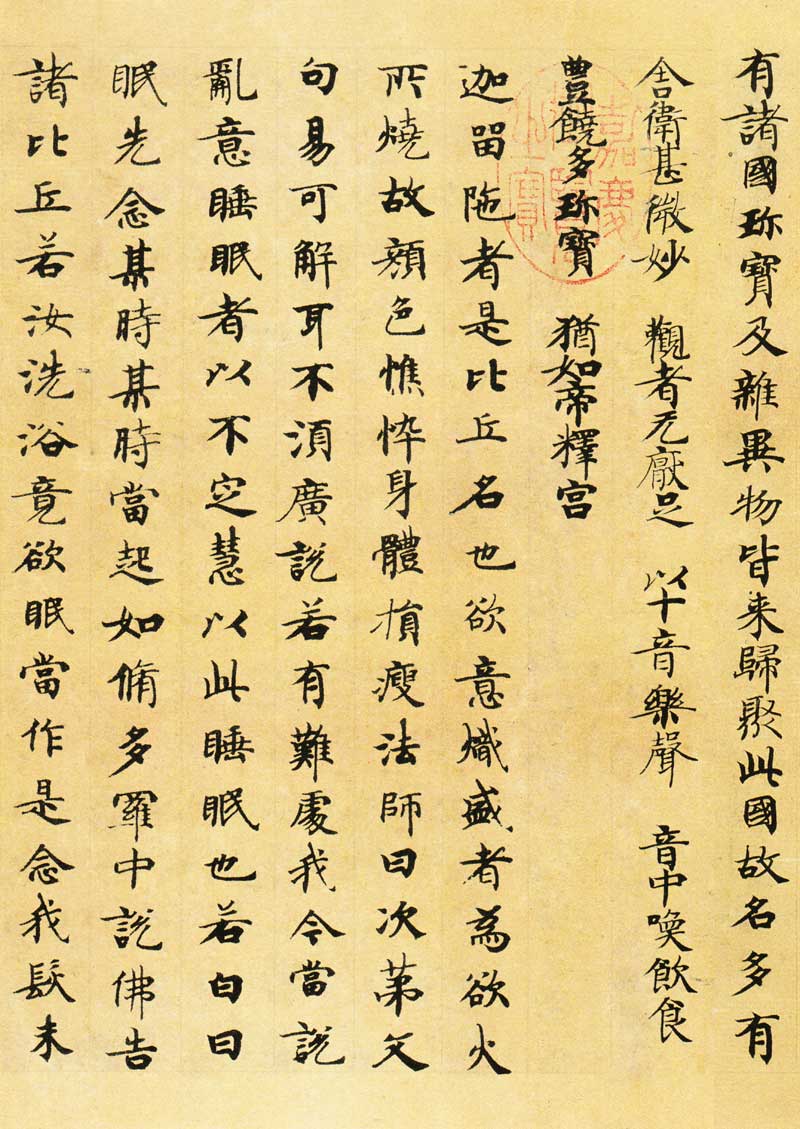
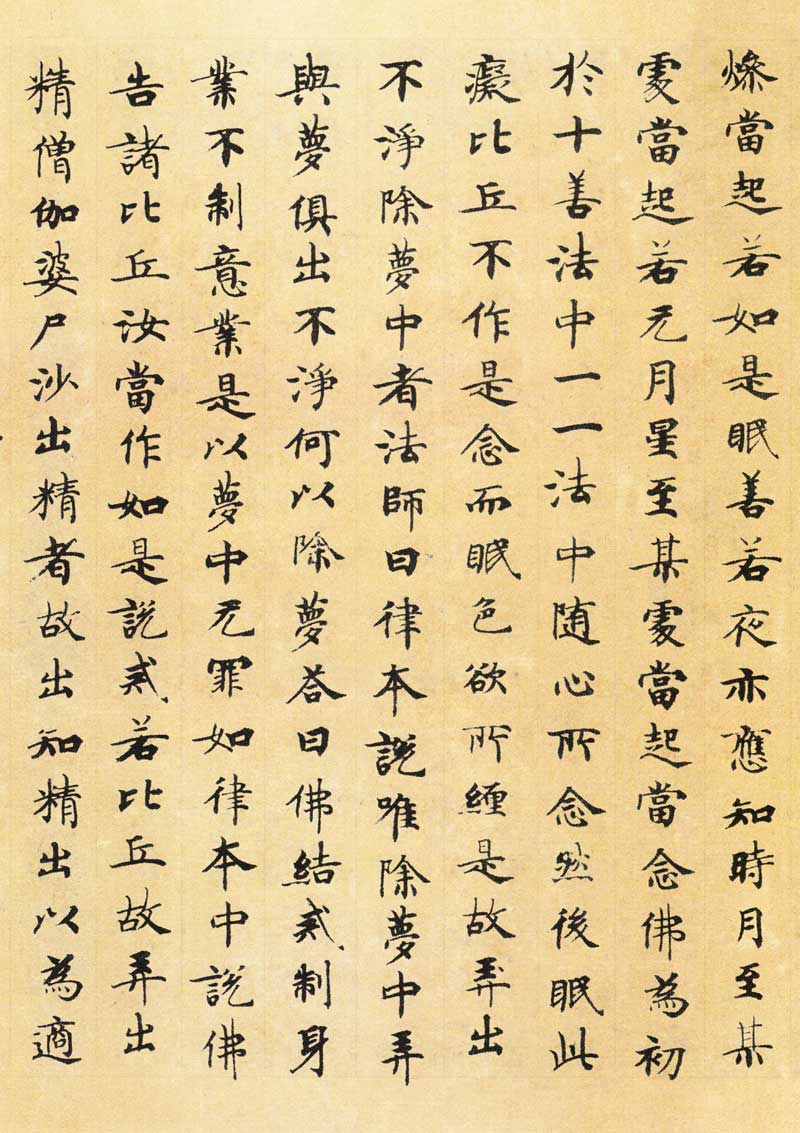
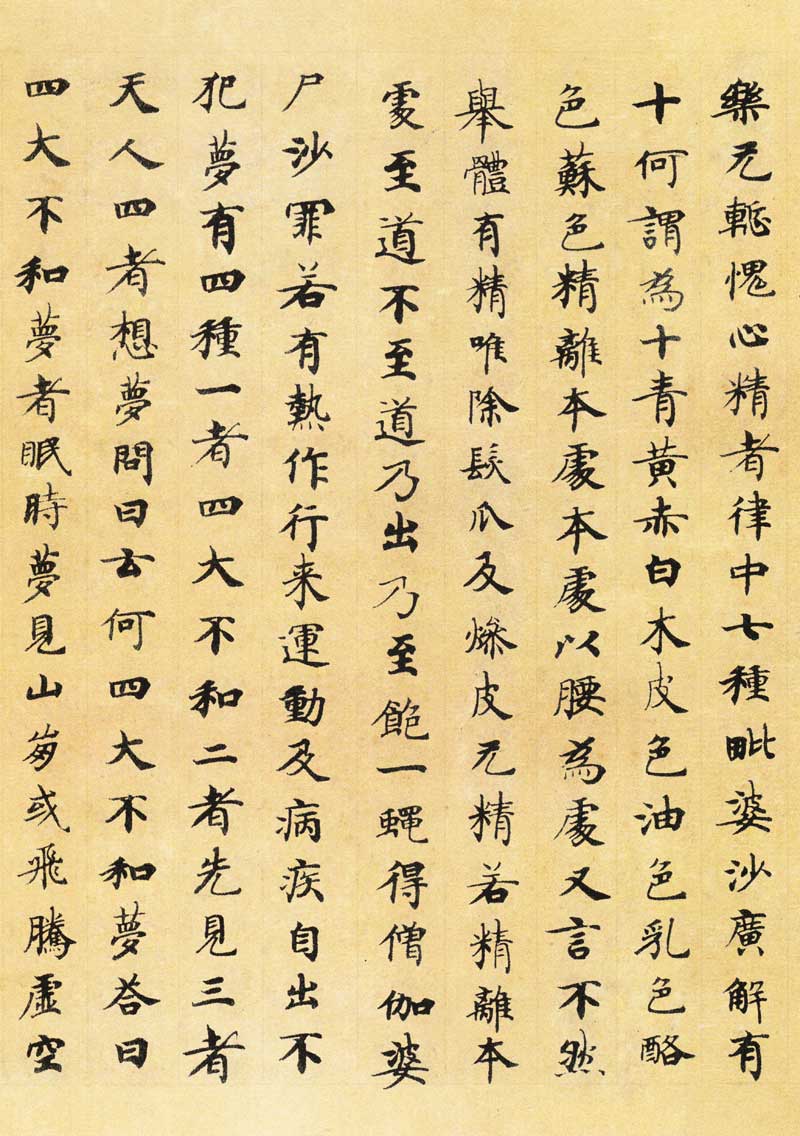
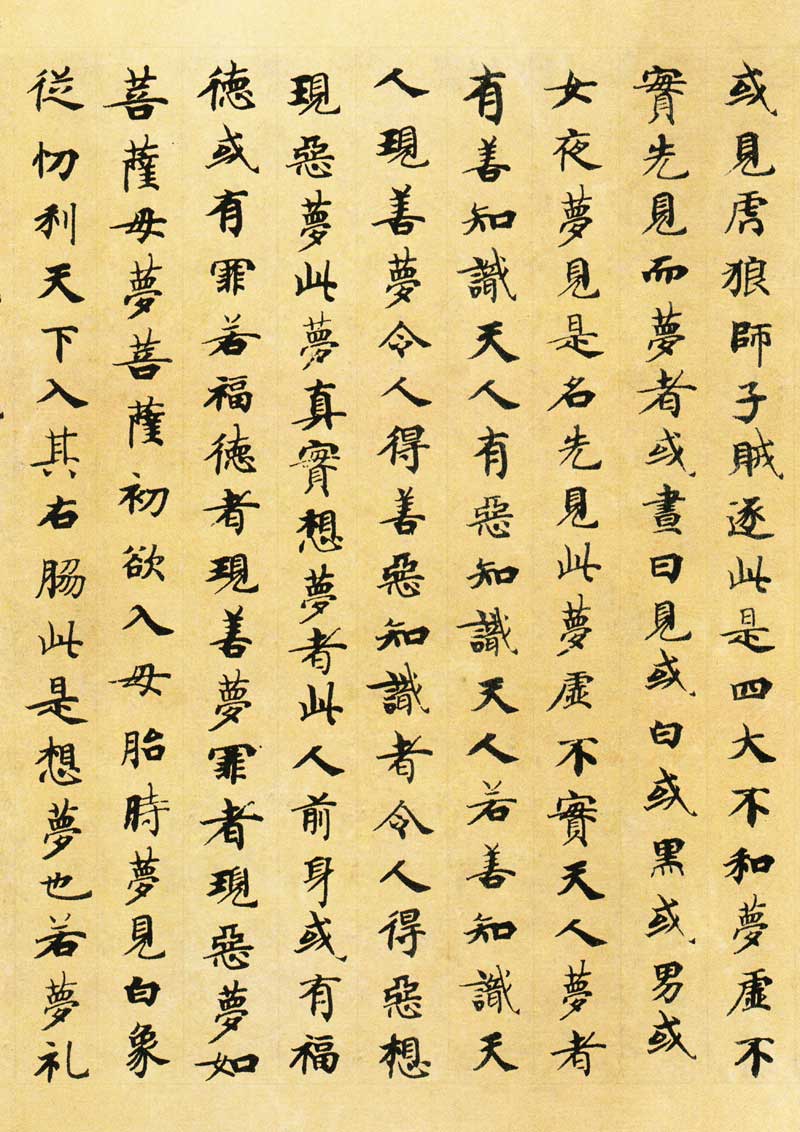
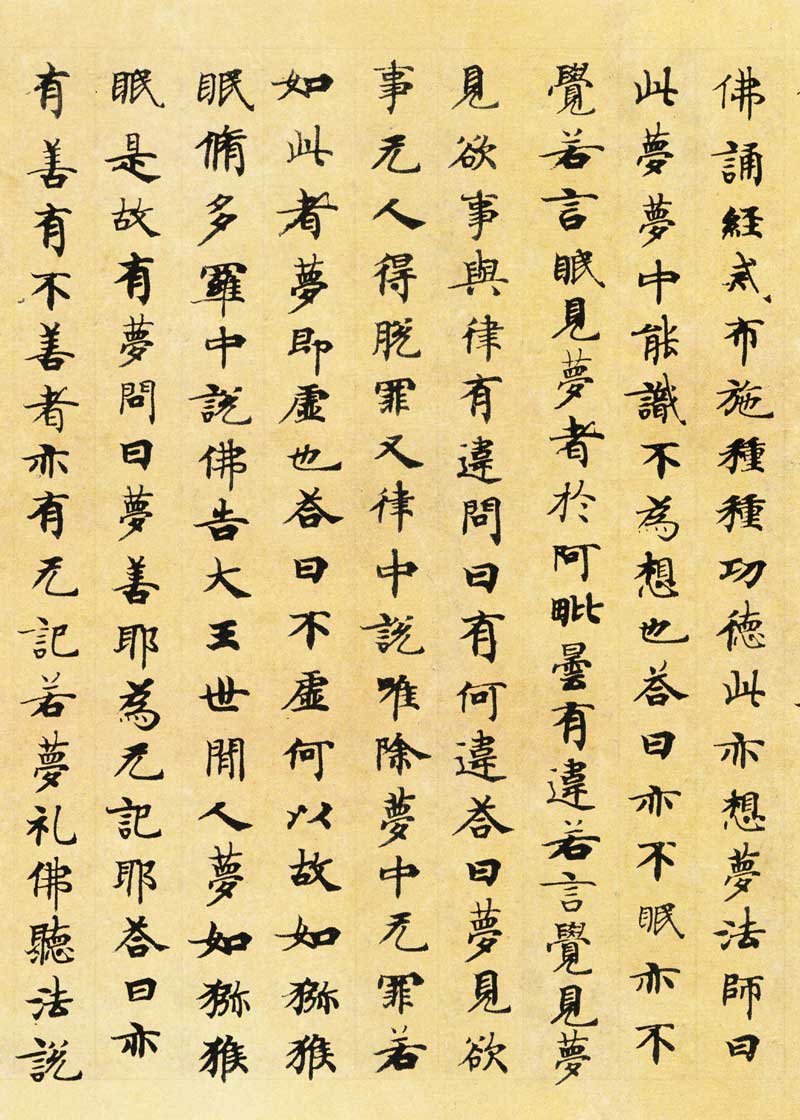
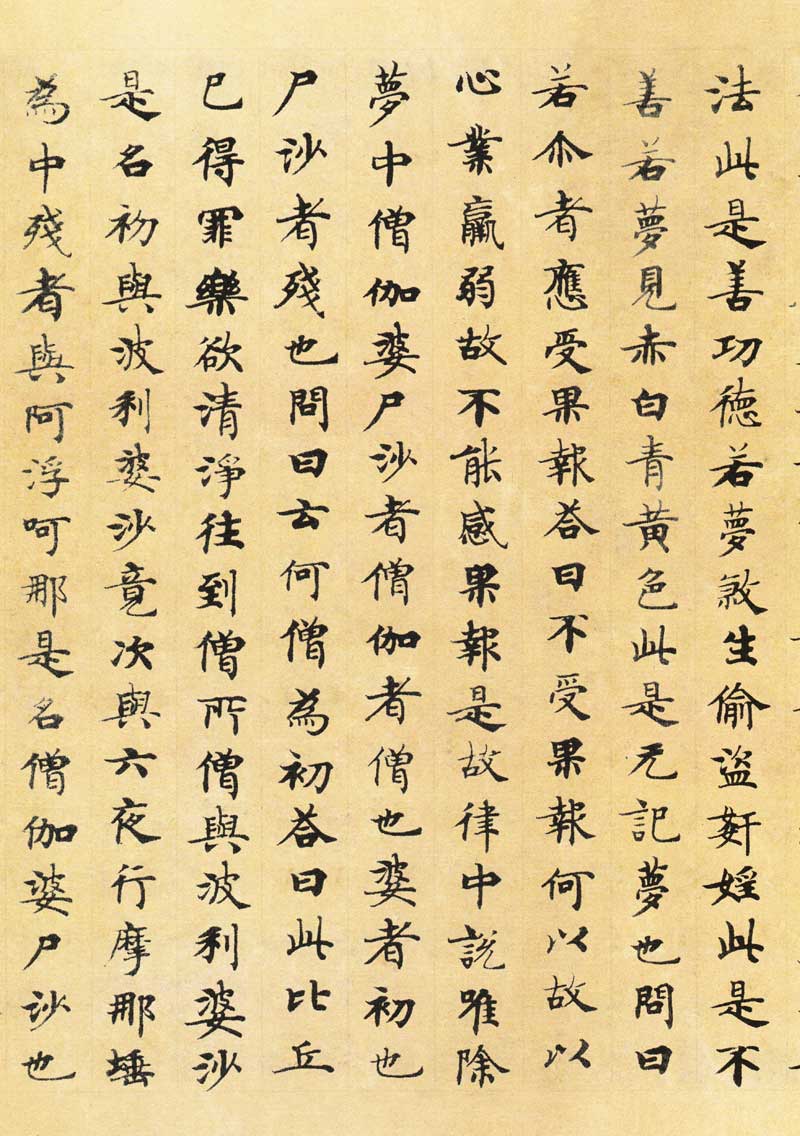
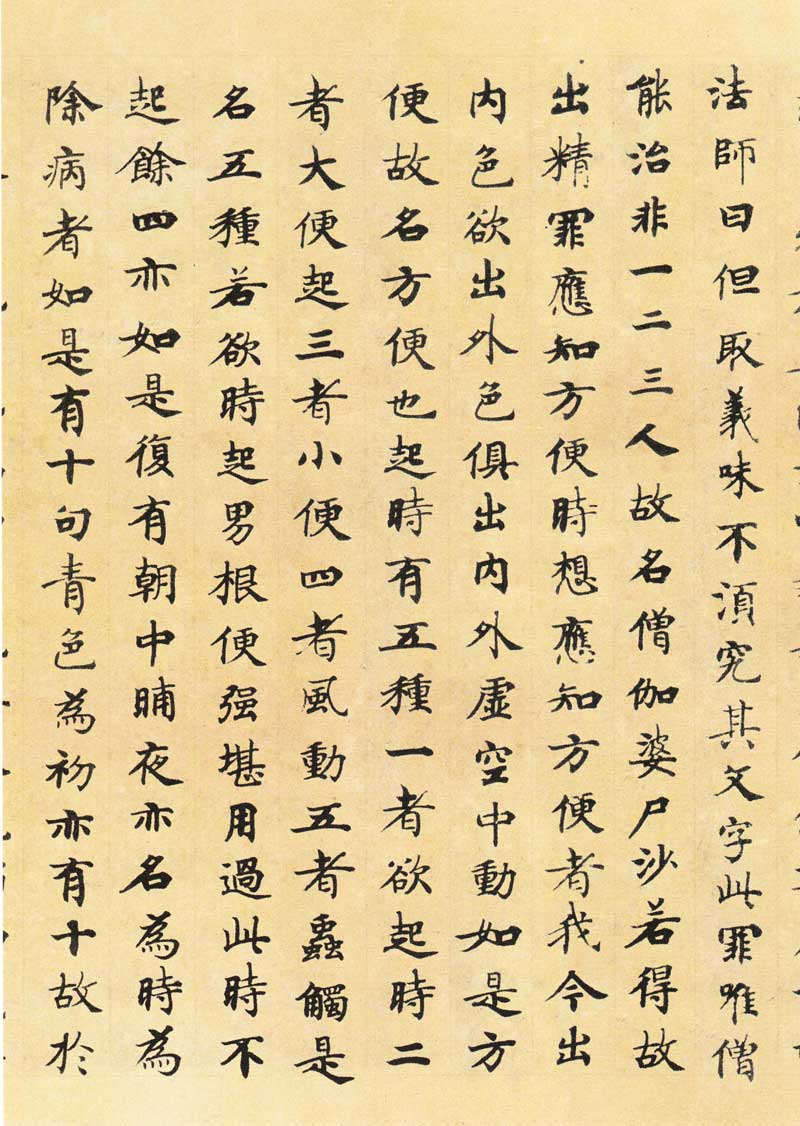
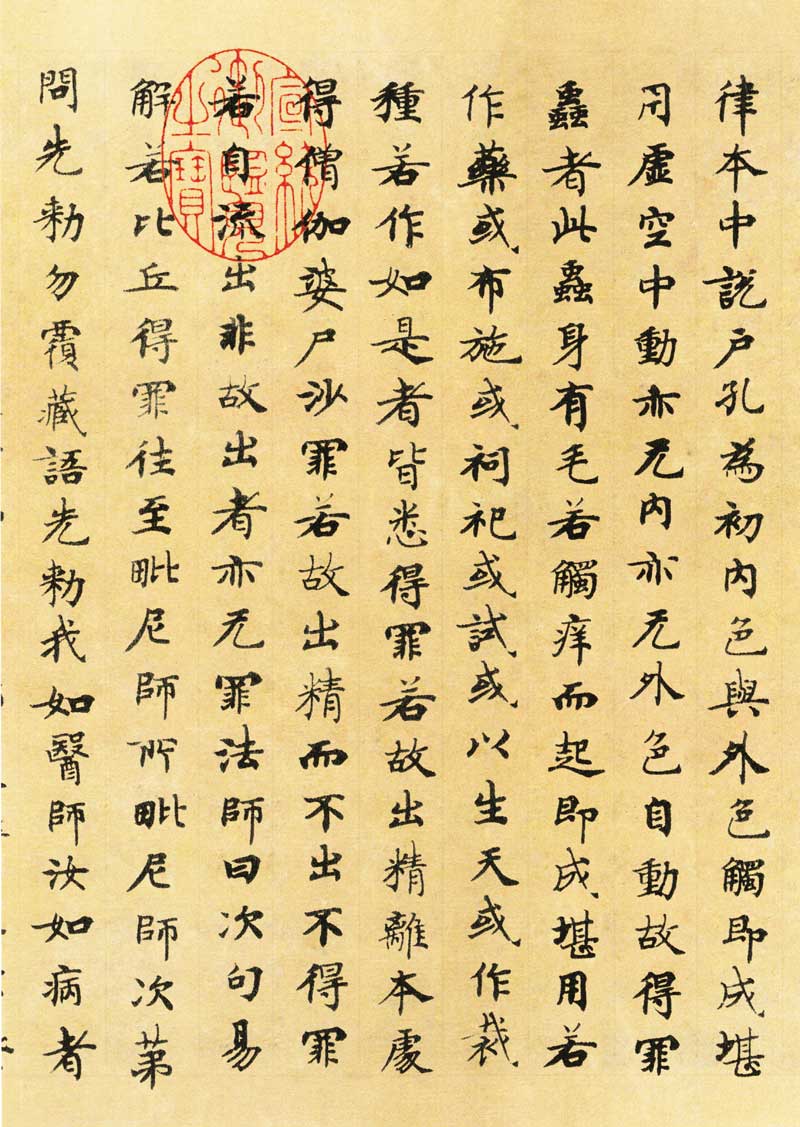
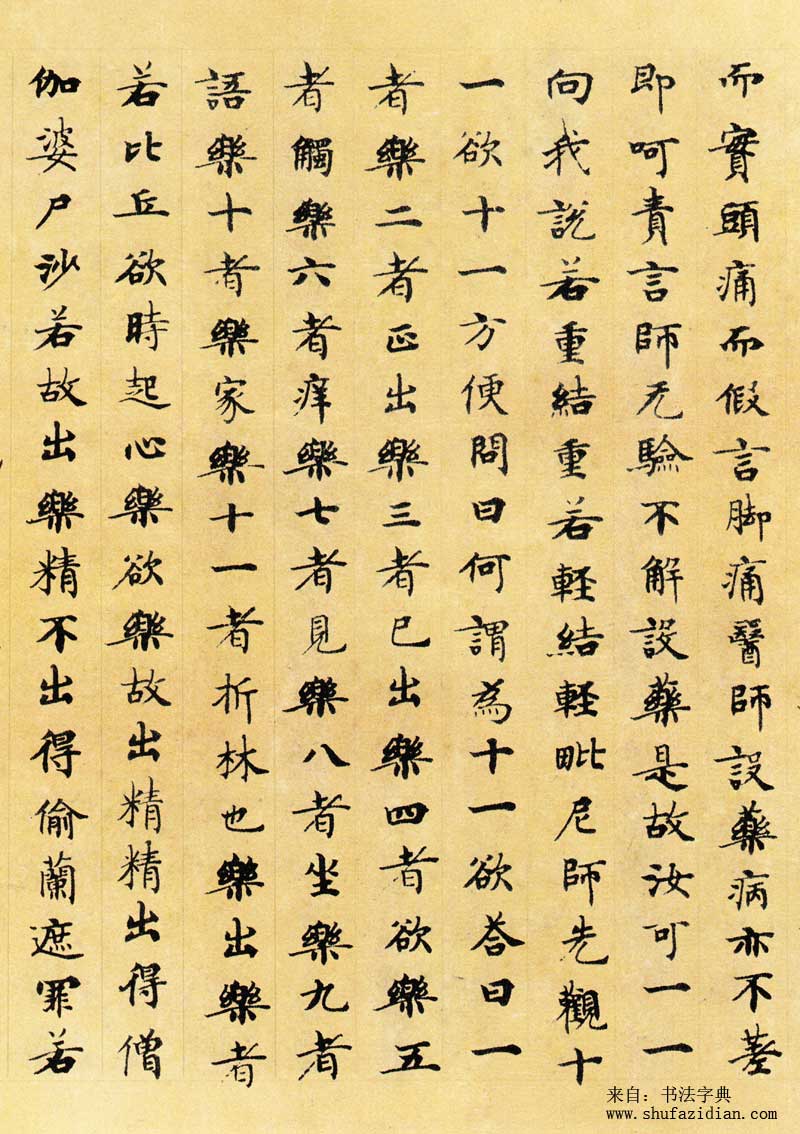
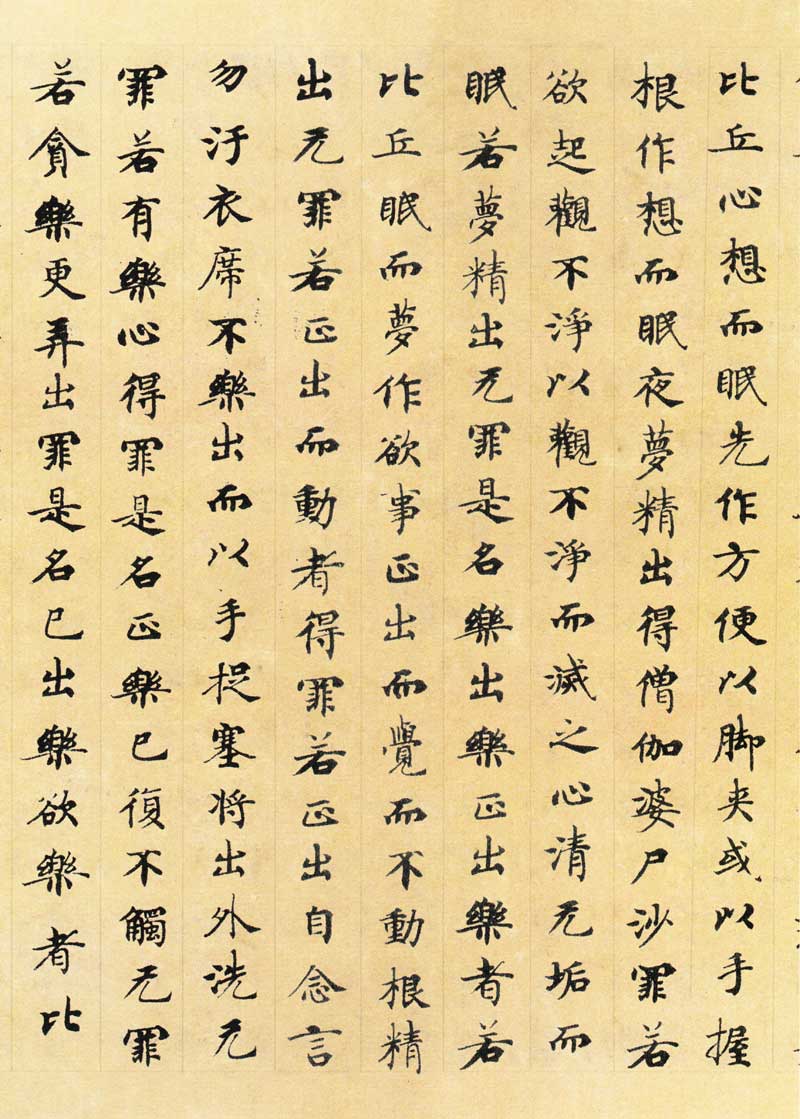
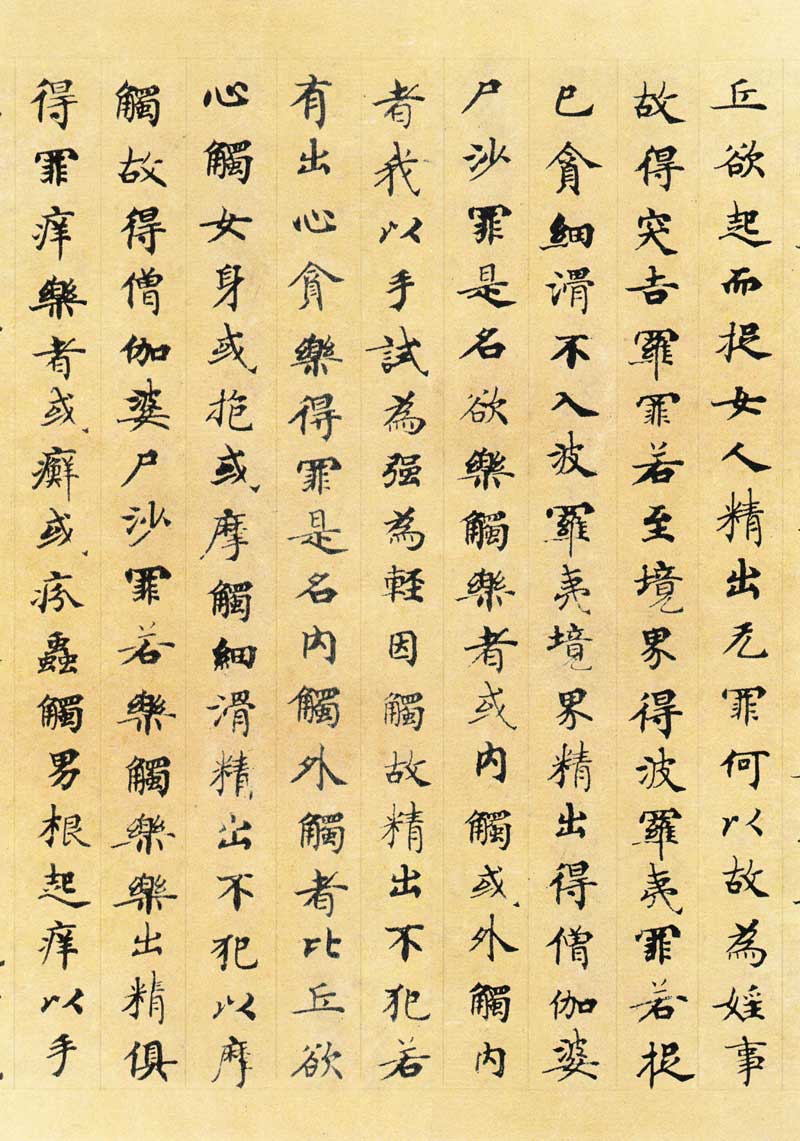
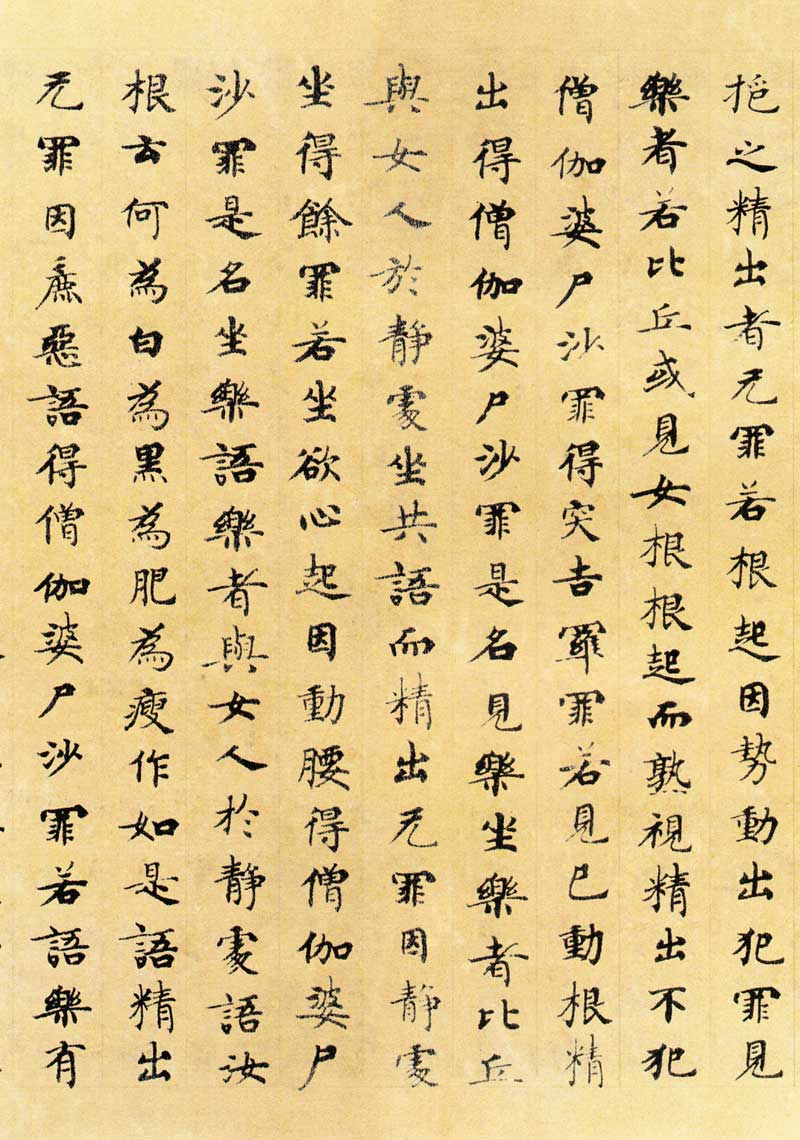
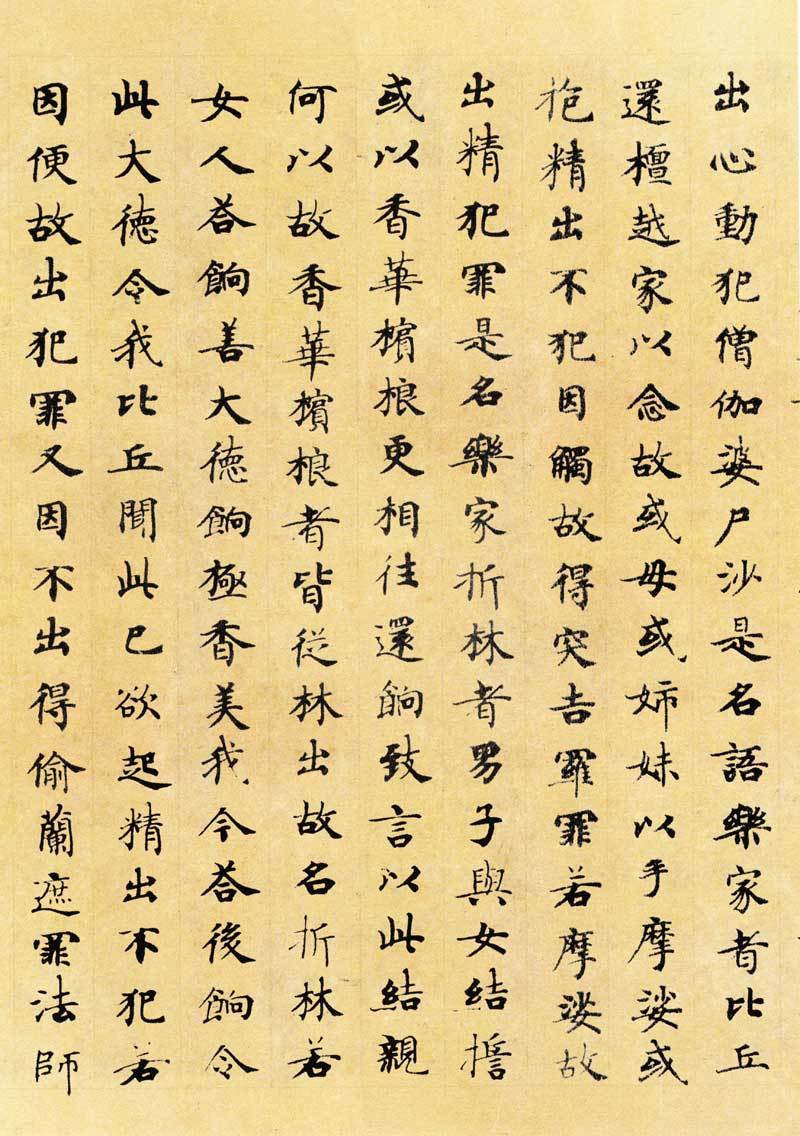
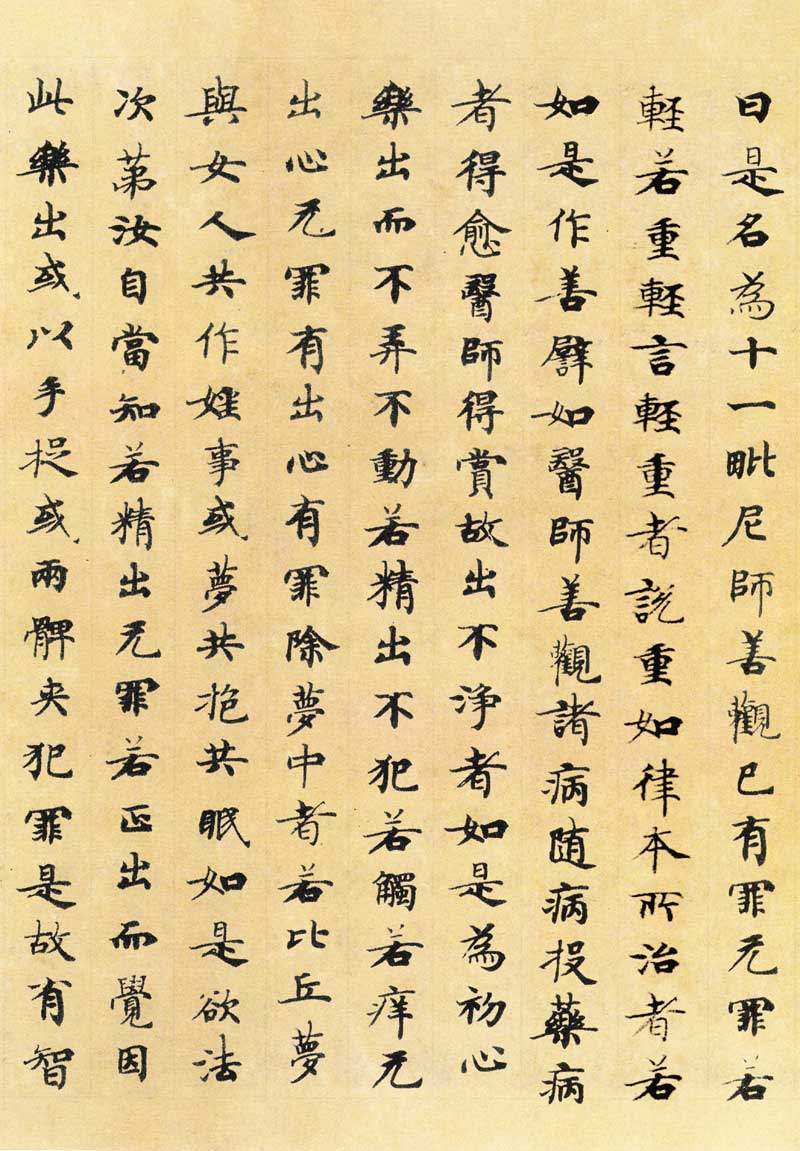
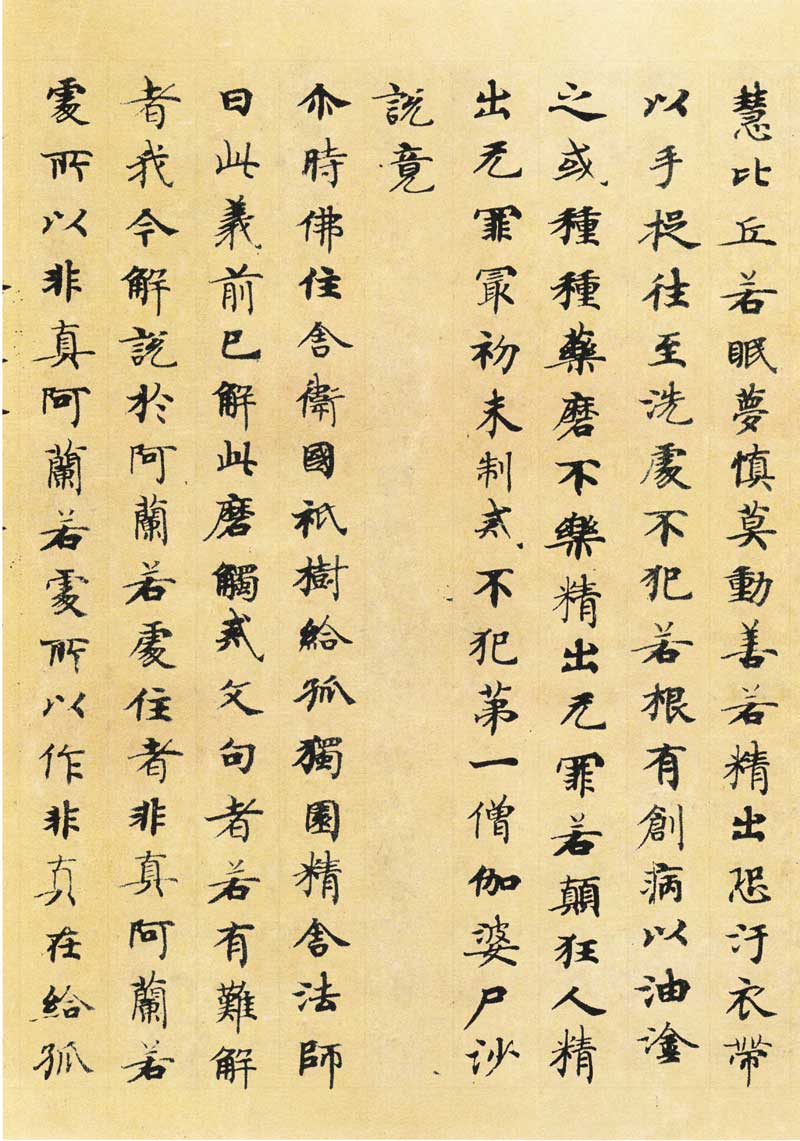
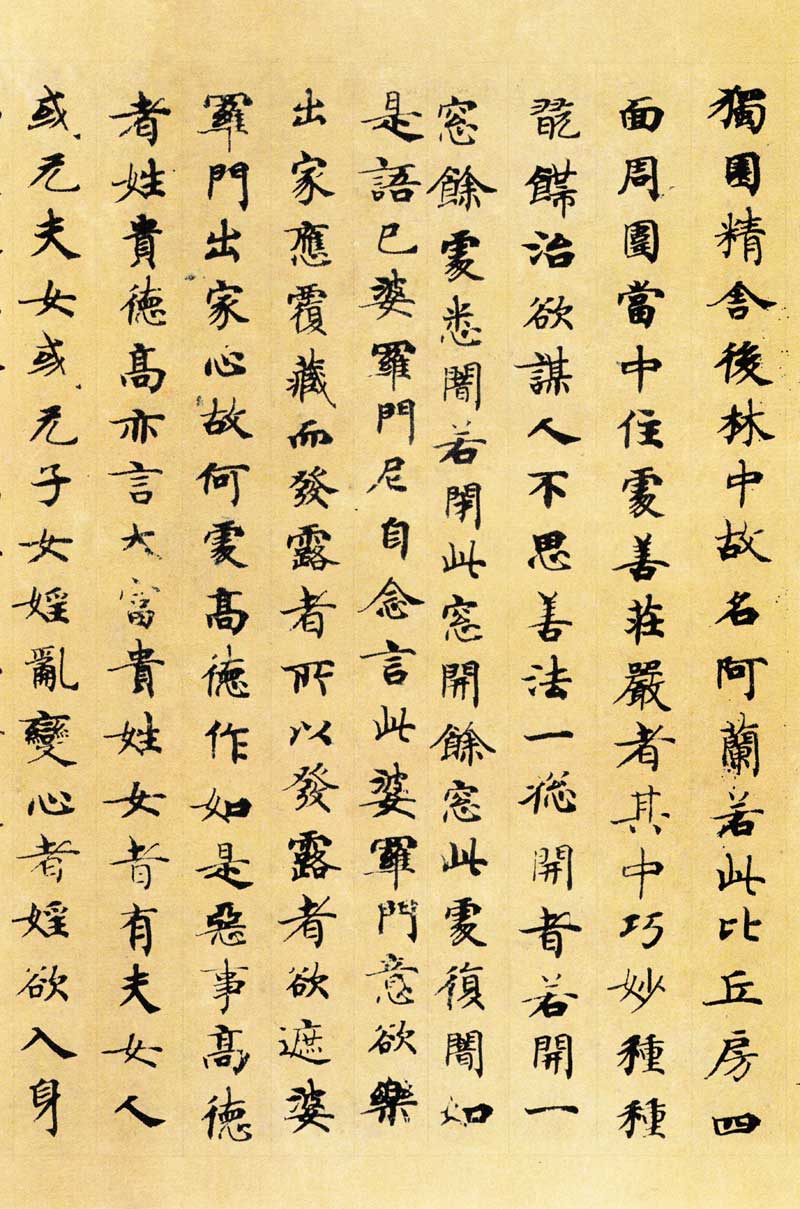
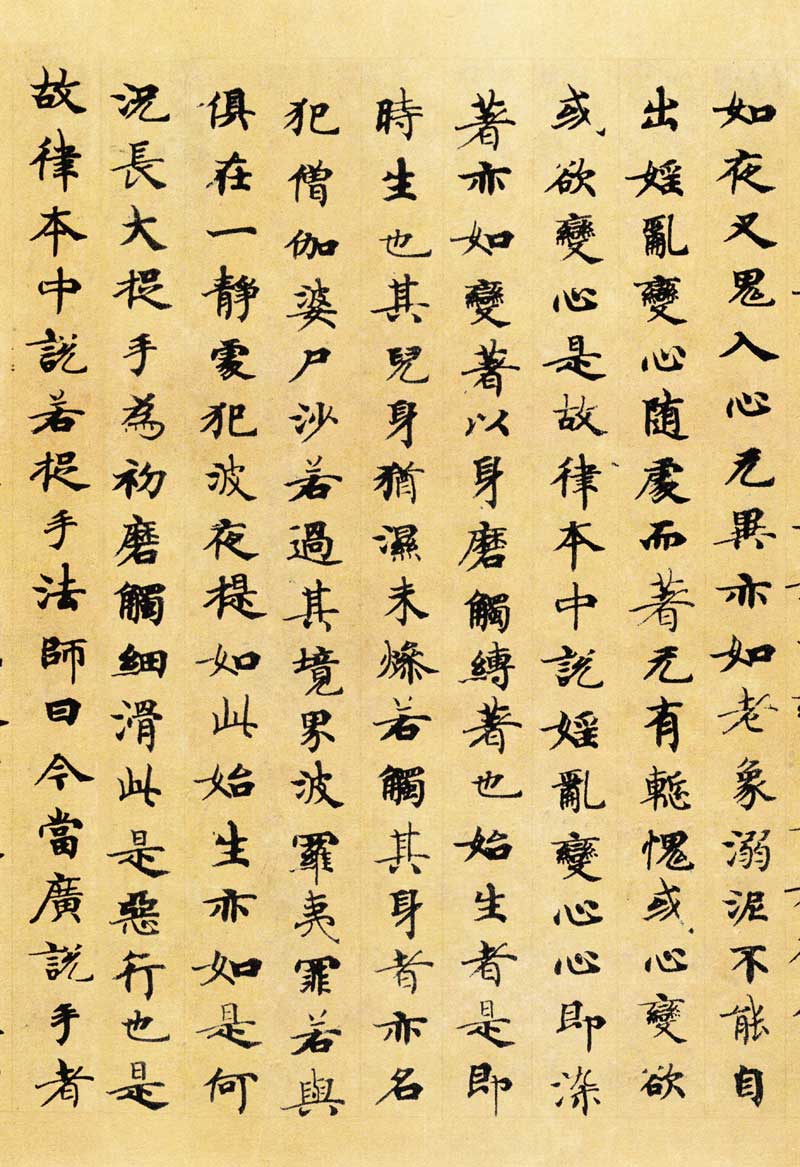
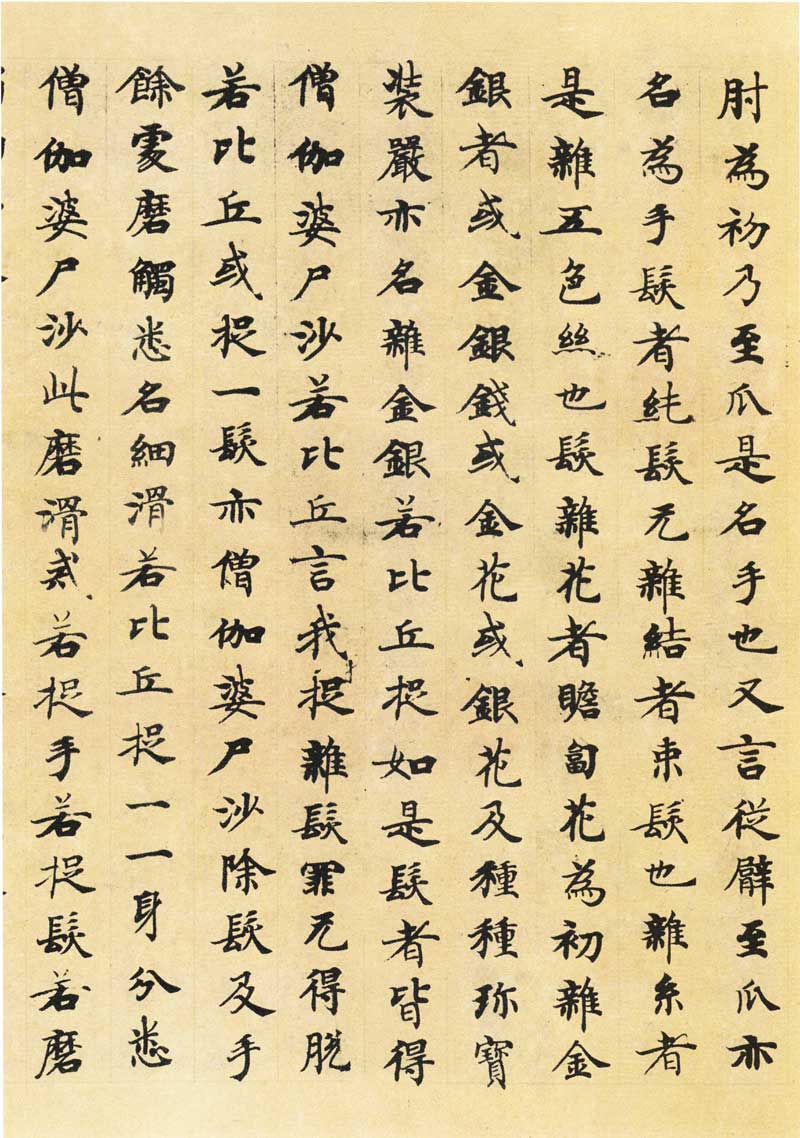
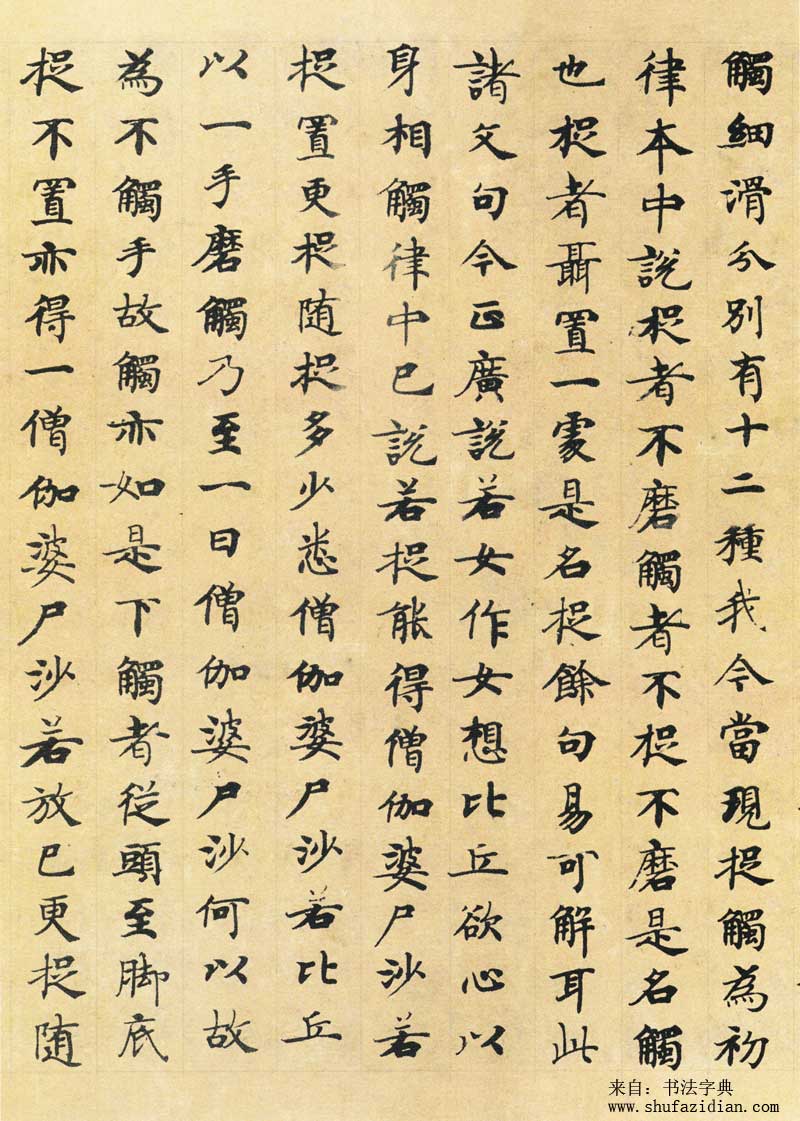
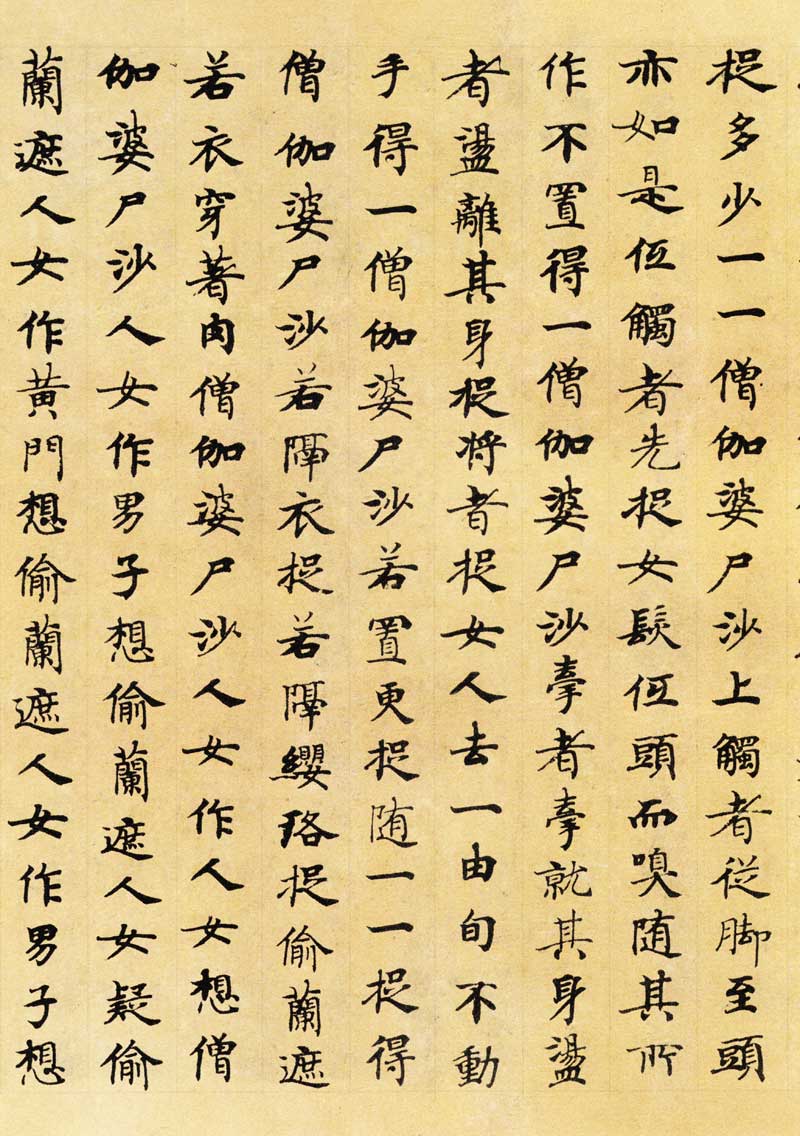
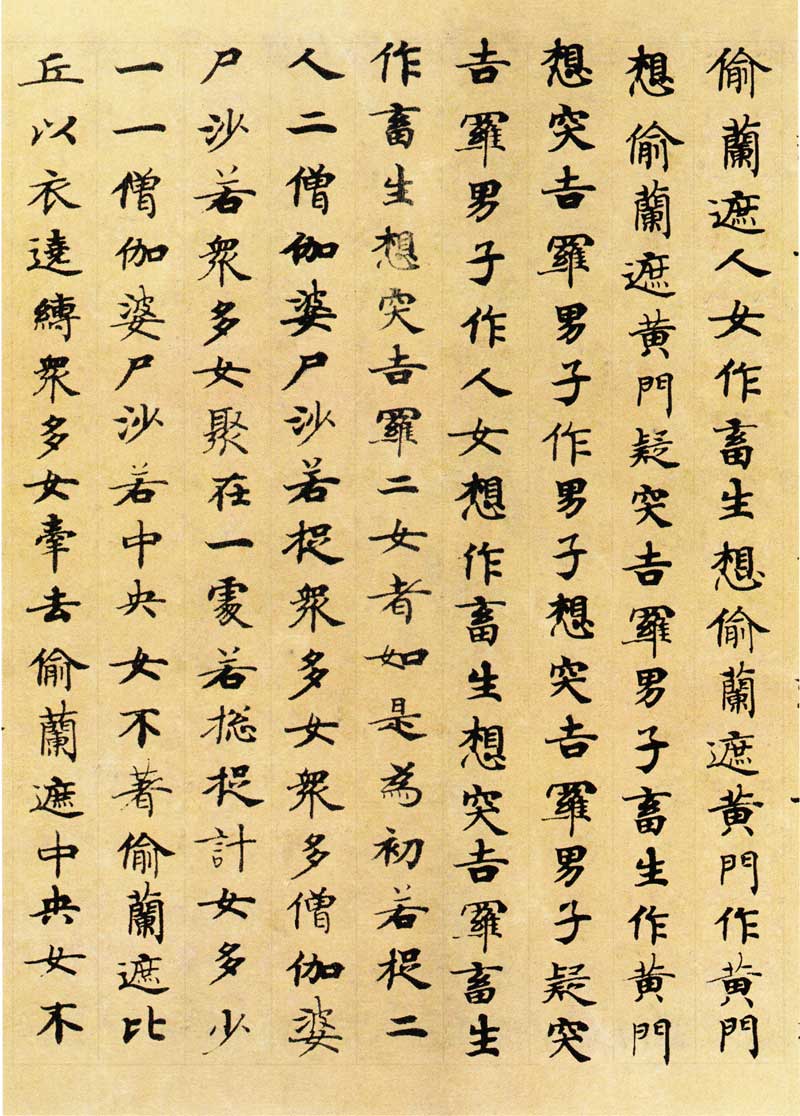
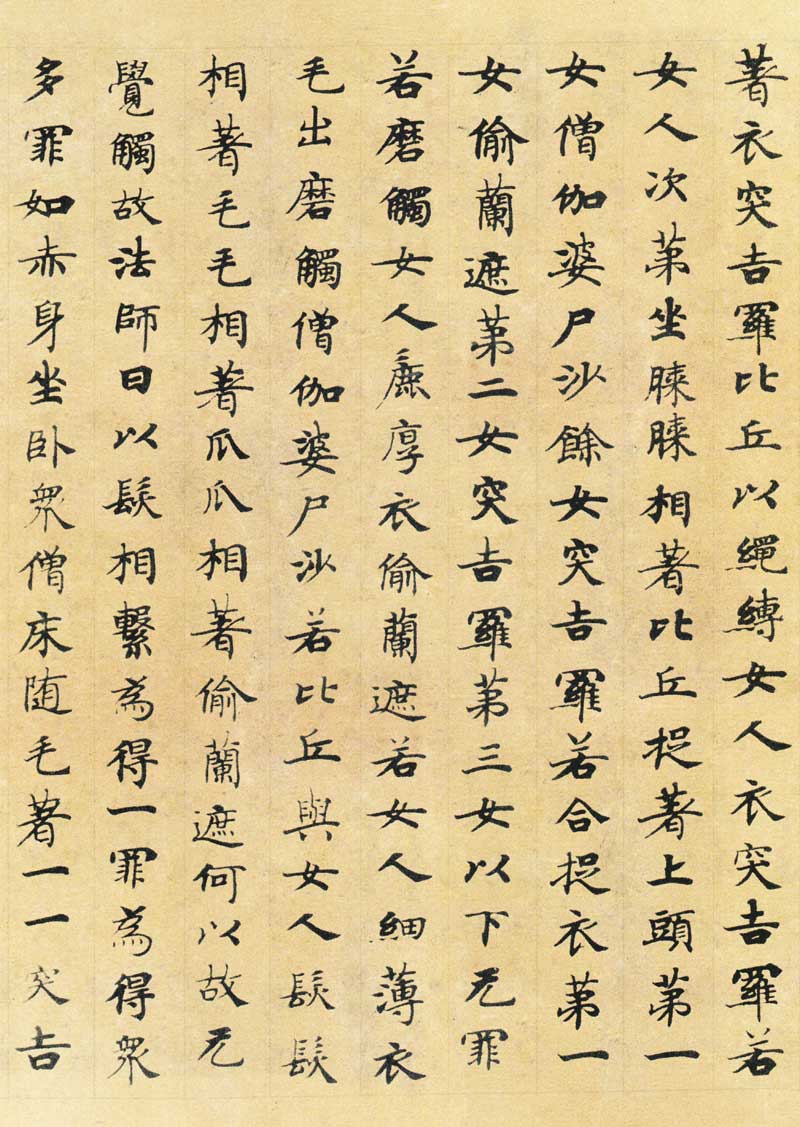
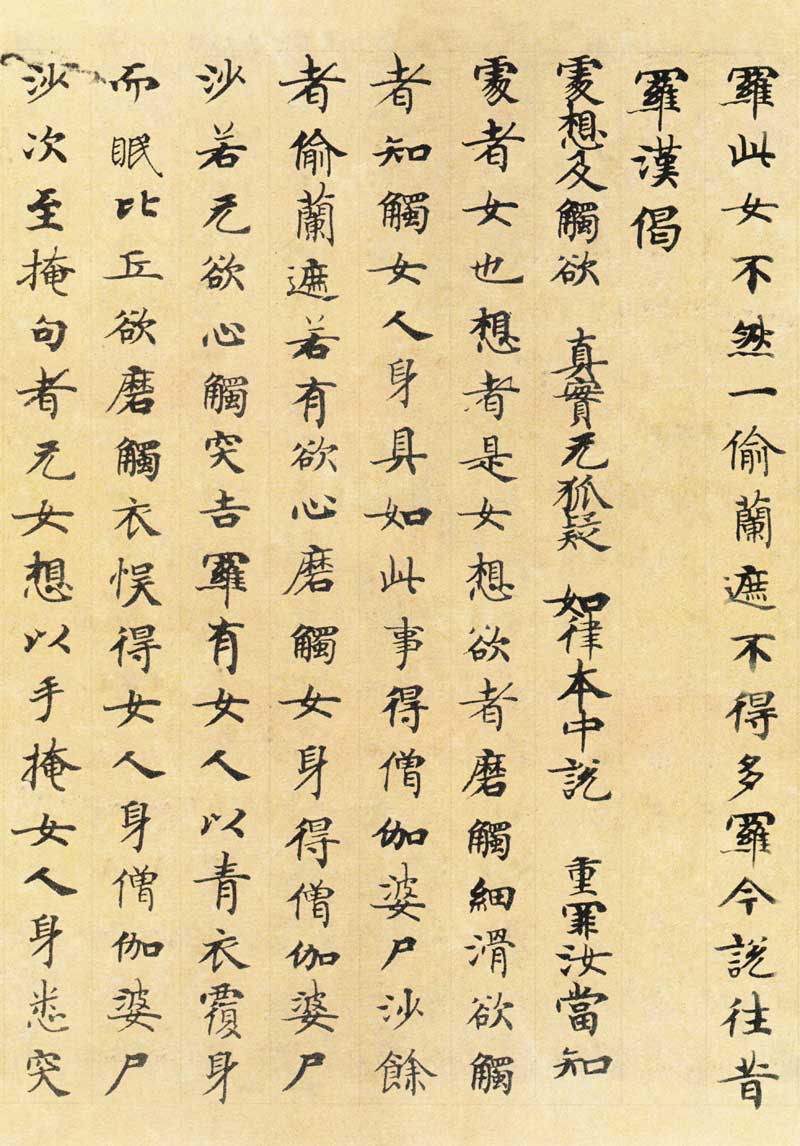
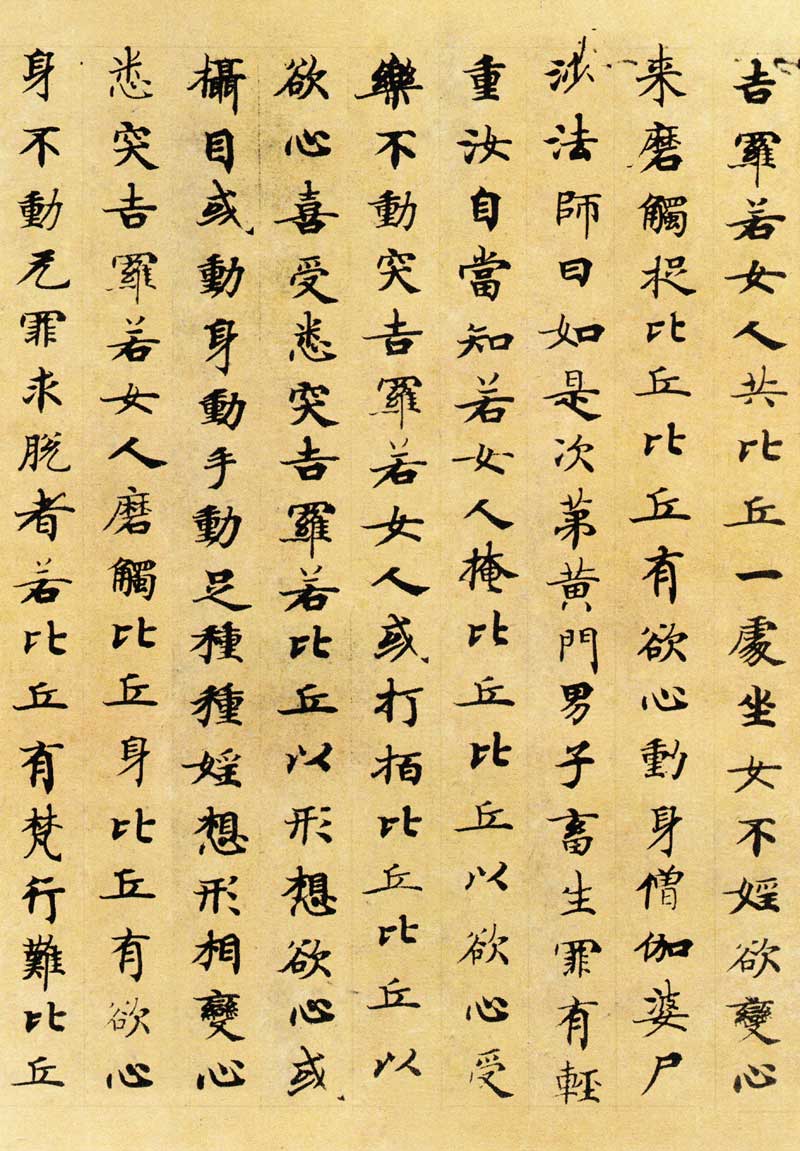
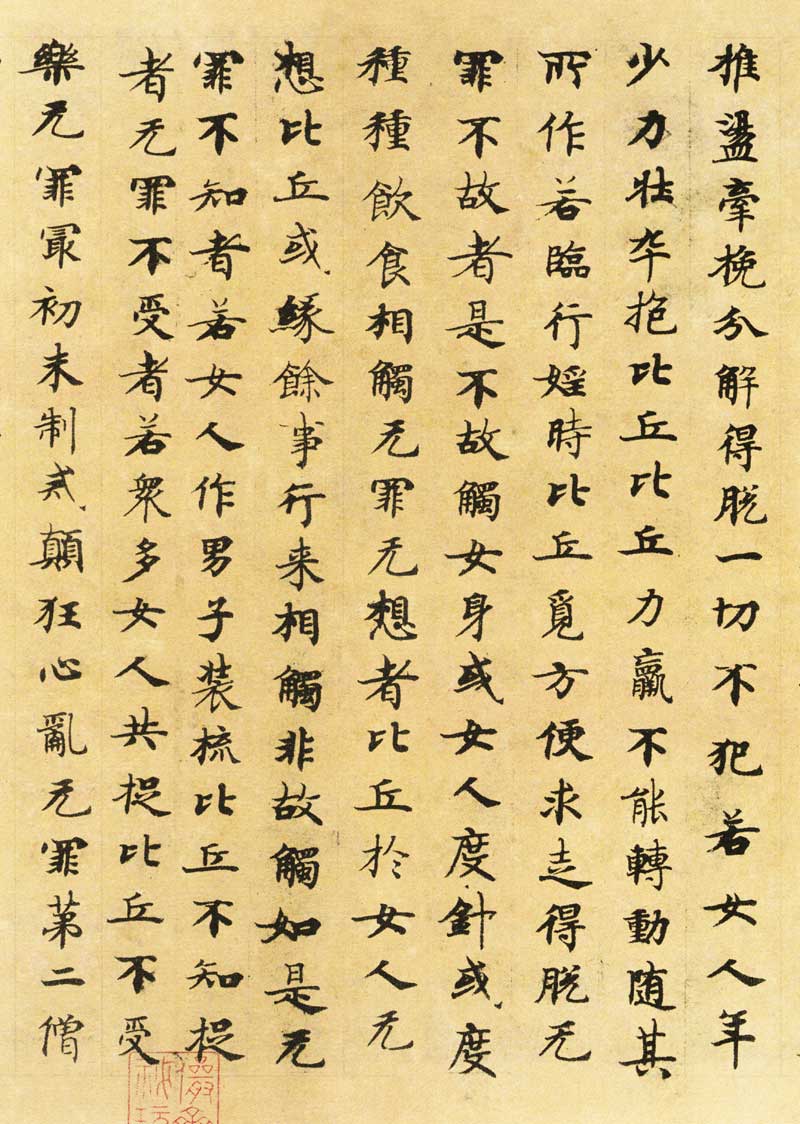
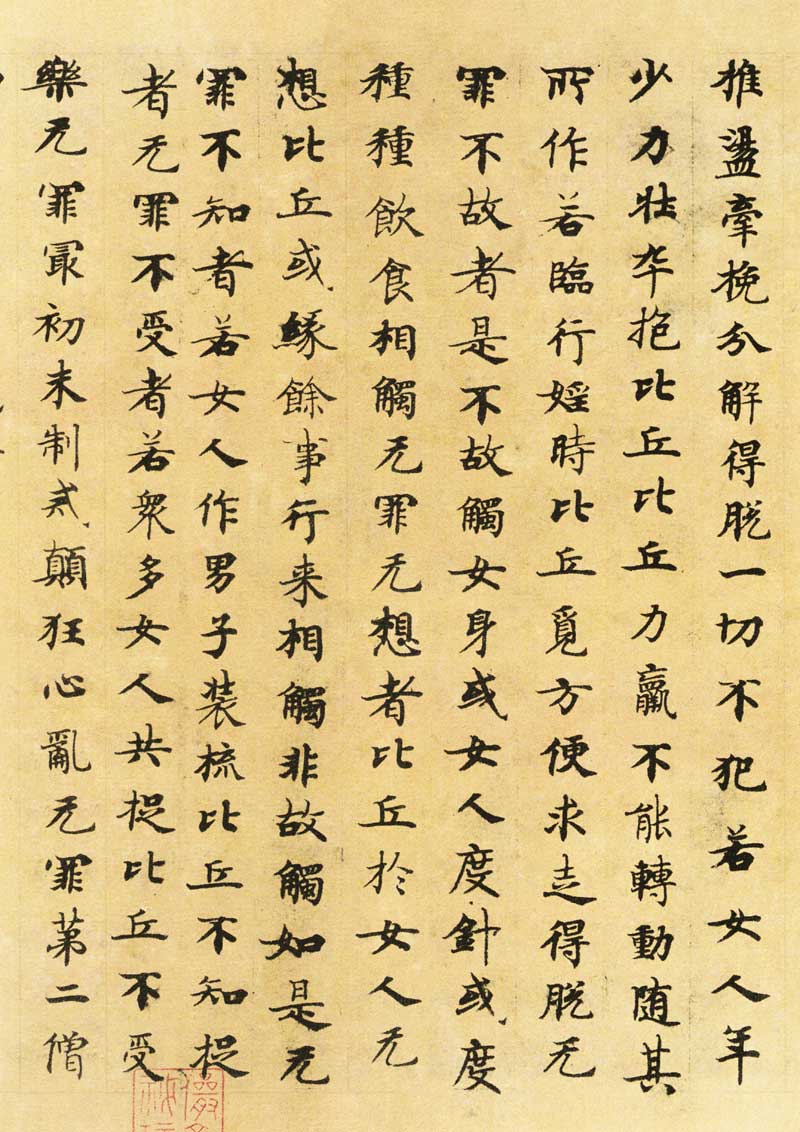
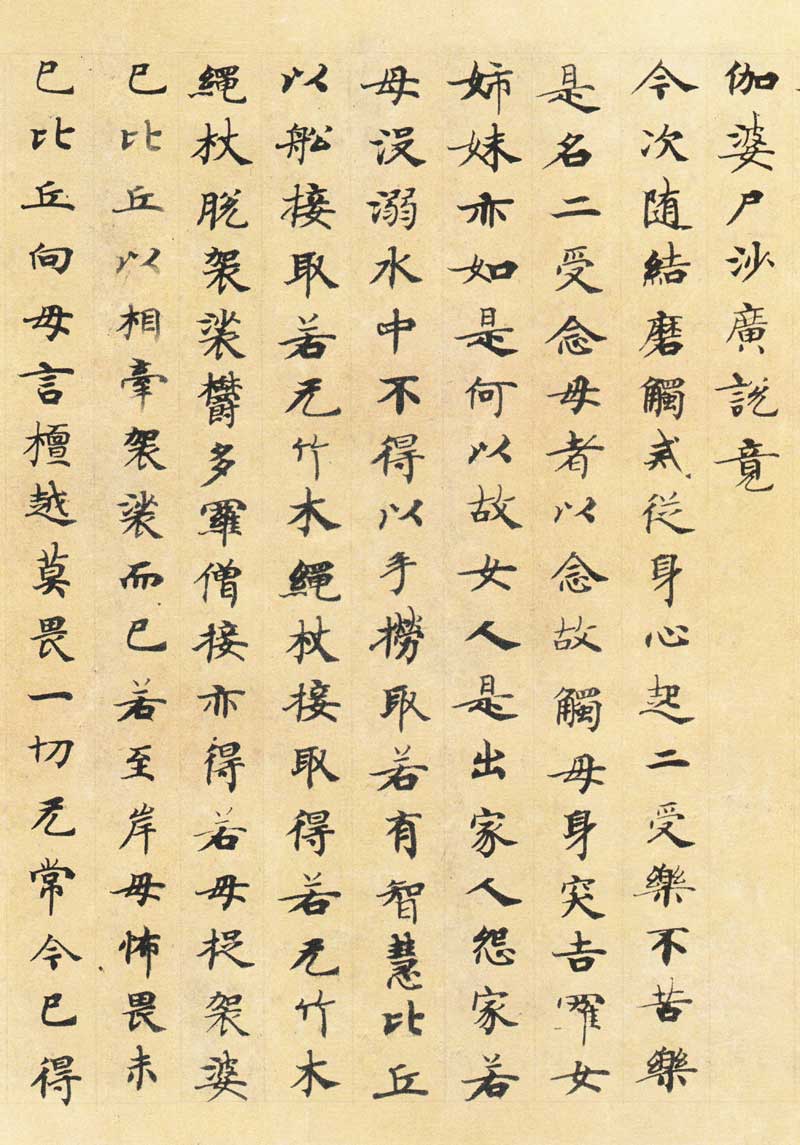
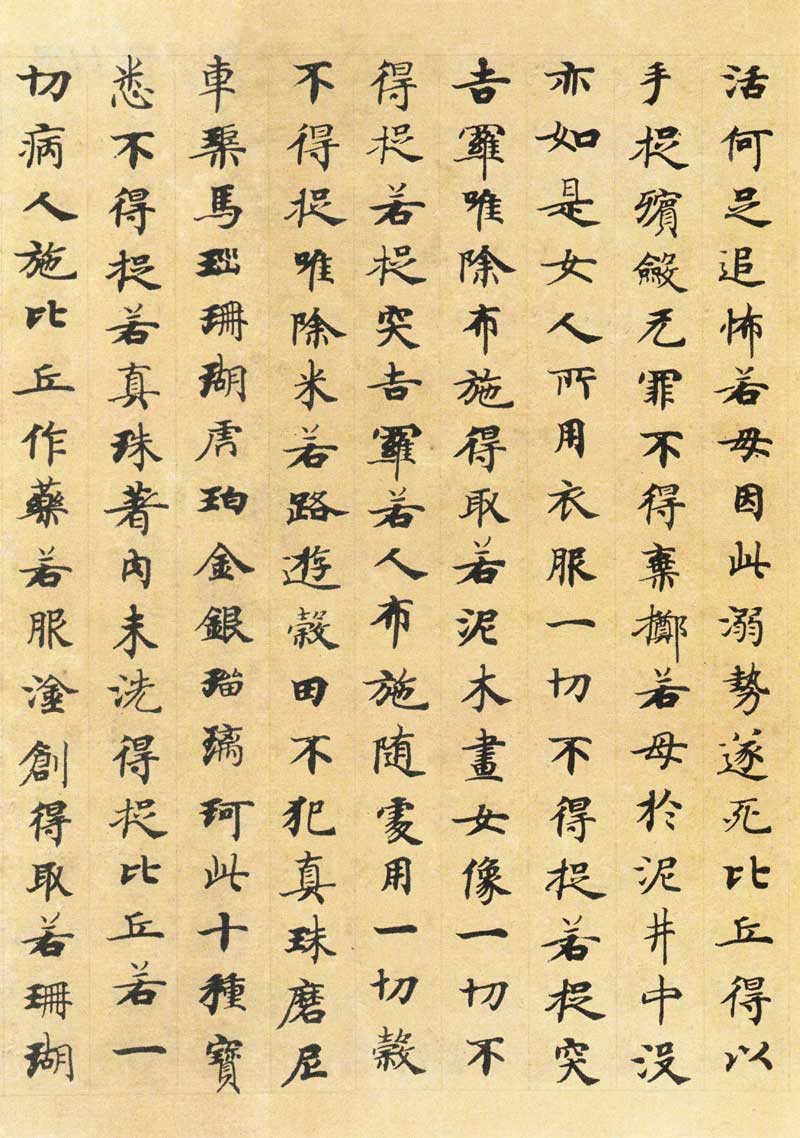
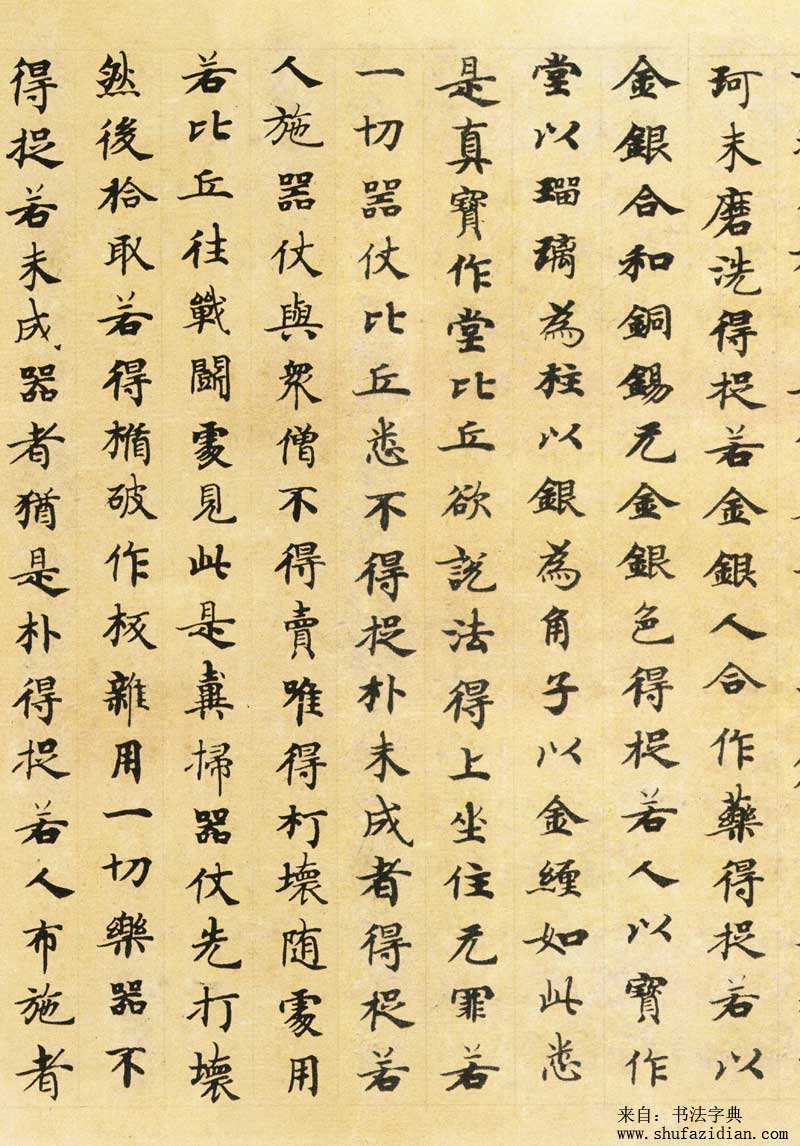
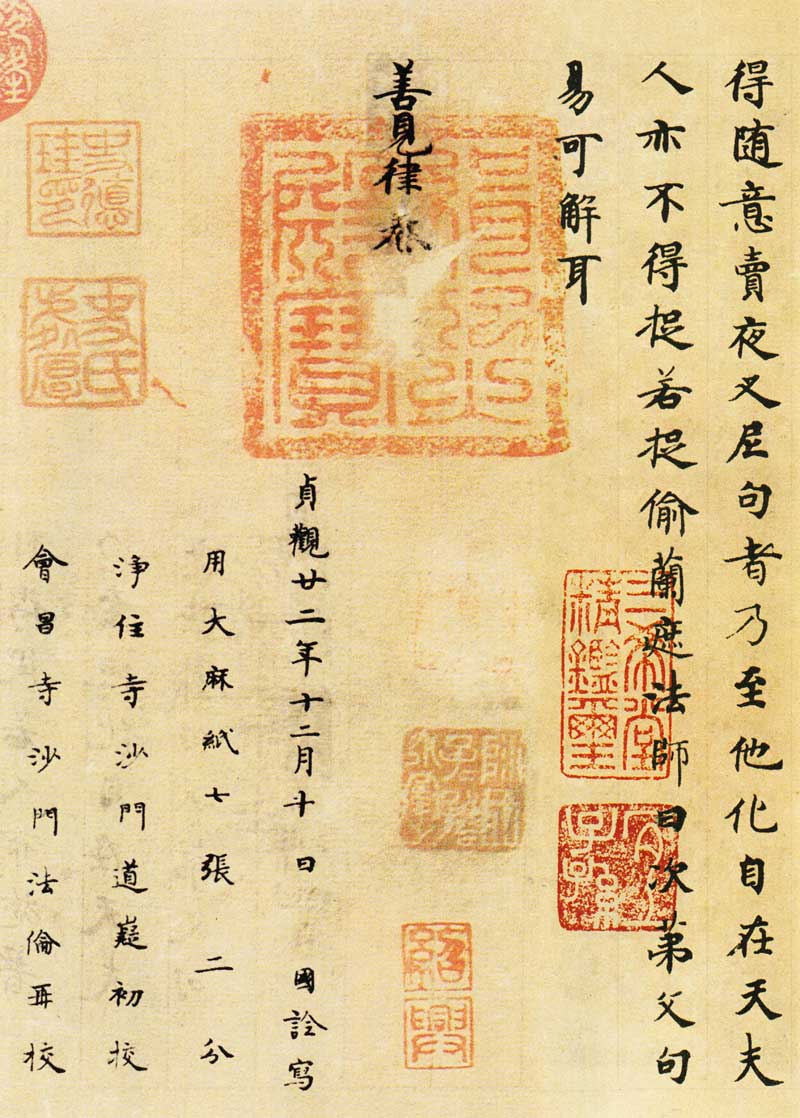
"At that time, the World-Honored One was traveling in the Acropolis. At that time, it was the time for the disciples of the Sravakas to take precepts, and it was not a time in the world. There were four who were traveling. What are the four? One was walking, the second was staying, the third was sitting, and the fourth was Lying down, these four methods are called traveling. For example, people say that when a king goes on a journey, he may go to a theater, walk, stand, sit or lie down. The same is true when the Buddha travels to Savannah. Savannah is the name of a Taoist priest. In the past, a Taoist priest lived here. In ancient times, a king saw that this place was good, so he begged a Taoist priest to establish a kingdom, and named it Rajagaha. Such as the city of Wangha. In the past, there was a wheel-turning king who even stopped this city, and named it Wangha city. The same is true for Sāvatthi. Sāvatthi is also called Duoyou. What is Duoyou? Treasures and miscellaneous foreign objects from all countries have come to gather in this country, so it is called Duoyou.
"Sravattva is so subtle that the observer is insatiable. It uses ten musical sounds, and the sounds call for food and drink. It is rich and full of treasures, just like the palace of Emperor Shiktar."
"Karyudha is the name of a bhikkhu. Those with ardent desires are burned by the fire of desire, and their bodies become emaciated and emaciated." The Dharma Master said, "It is easy to decipher the sentences in the sequence. There is no need to speak widely. If there is any difficulty, I will say it now. Those who sleep with confused thoughts use this kind of sleep with uncertain wisdom. If you sleep during the day, first think of a certain time when you will wake up. As mentioned in Sutra, the Buddha told the bhikkhus: "If you take a bath and want to fall asleep, Think of it this way: "My hair is not dry yet, so it would be good to sleep like this." If it is night, you should also know the time. The moon will rise somewhere. If there is no moon, the stars will rise somewhere. When reciting the name of Buddha as the beginning, you should recite each of the ten virtuous dharma according to your heart, and then sleep. ’ This crazy bhikkhu sleeps without thinking such thoughts, and is entangled in lust, thus causing impurities, except those in dreams. "
The Master said: "But to get the meaning, there is no need to study the words. This crime can only be cured by the monks. It is not just one, two or three people, so it is called Sangha Po Shisha. If you find the reason for the sin, you should know the expedient and think about it at the time. Those who know the expediency, now I have inner color, and I want to have the outer color, both inside and outside, moving in the void, such expediency is called expediency. There are five kinds of expediency: one is when desire arises, the other is when defecation occurs, and the third is when urination occurs. , the fourth is wind movement, the fifth is insect contact, these are called five kinds. If you want to have a male root at this time, it will be strong enough to use it. If you can't wake up after this time, the same is true for the other four. There is also a mid-afternoon night, which is also called time. Those who cure diseases. "There are ten sentences like this, green is the beginning, and there are ten reasons. It is said in the Vinaya that the opening of the door is the beginning. When the inner color and the outer color touch, it becomes usable. When it moves in the void, there is no inner or outer color, so it automatically offends. Insects, these insects have hairy bodies. If they are itchy, they are ready for use. If they are used as medicine or alms, or for worshiping or doing experiments in temples, or for raising heaven or for planting. If you do this, you will be offended. If you do this, you will be offended. If the semen comes out and leaves its original place, it will cause the sin of Sangha Po's corpse. If the semen comes out for a reason but does not come out, it is not a crime. If it flows out spontaneously and does not come out for a reason, it is not guilty. "
The Dharma Master said: "The second sentence is easy to understand. If a bhikkhu is offended, he goes to the place where Master Binyi is. Master Binyi will ask: "First of all, do not repeat the Tibetan language. First of all, I am like a doctor. You are like a sick person who has a real headache but a false one. When you say you have pain in your feet, the doctor prescribes medicine and the disease is not bad." Then he scolded and said: "The teacher has no experience and cannot explain the medicine, so you can tell me one by one, if the knot is heavy, it will be heavy, if the knot is light, it will be light." Master Bini said First, consider the eleven desires and the eleven expedients." He asked, "What are the eleven desires?" The answer was, "The first is happiness, the second is happiness that is emerging, the third is happiness that has emerged, the fourth is desire happiness, and the fifth is touch happiness. , the sixth is itching pleasure, the seventh is seeing pleasure, the eighth is sitting pleasure, the ninth is talking pleasure, the tenth is home pleasure, and the eleventh is breaking forest. If a bhikkhu wants to be happy, he will feel happy when he desires it. The semen comes out, so the semen comes out, so you get the monk's corpse sand. If it comes out, the semen does not come out, you have to steal the orchid to make up for the sin. If the bhikkhu falls asleep due to thoughts, first make a convenient way to hold the root with your feet or hold the root with your hands, and think about it. When you sleep, the dream spirit comes out, and you will be guilty of the sin of Sangha and Po's corpse. If you want to think about the impurity, it will be destroyed because of the impurity. If your mind is pure and untainted and you sleep, if the dream spirit comes out, you will be blameless. This is called happiness. It is right. For those who are happy, if a bhikkhu is asleep and dreams about desirous things, and if he is aware of it without moving his roots, then his essence will be guiltless. . And use the hand to catch the plug, and go out to wash away the innocent. If there is a desire for pleasure to offend, this is called true happiness, and it will no longer touch the guilt. If the greed for pleasure leads to sin, it is called out of pleasure. Those who desire pleasure, bhikkhu desire If you get up and catch a woman, you will not be guilty of semen. Why? If it is an incident of sexual intercourse, you will be guilty of Tujila. If you reach the realm, you will be guilty of parasi. If you catch a woman and you are greedy and slippery, you will not enter the realm of parasi. If you do not enter the realm of parasi, you will be guilty of monk. The sin of Kapo Shisha is called sensual pleasure. Those who touch pleasure may be internal or external. For internal ones, I will test it with my hands and choose it as strong or light. Because of the touch, the essence will not be committed. If there is an out-of-mind greed for pleasure and offend it, this is the name of the crime. Internal touch. For external touch, if a bhikkhu desires to touch a woman's body, or hugs or rubs the body, the smooth fluid will not come out. If he rubs it, he will be guilty of the sin of Sangha Poshasha. If he is happy to touch, or if he is happy to release semen, he will be guilty of itching. Pleasure of itching If ringworm or scabies touches the male root and causes itching, and the semen comes out by grasping it with the hand, he will not be guilty. If the root arises due to the situation, he will commit a crime. If a monk sees a female root, the root rises and the semen comes out, he will not commit the crime. If you see the sin of Sanghavashisha, you will get Tujila sin. If you see the moved root essence coming out, you will get the sin of Sanghavashisha. This is called seeing happiness. For those who sit for happiness, the bhikkhu and the woman sit in a quiet place, talk together and the essence will come out. There is no sin, because sitting in a quiet place is a sin. If the desire to sit is caused by moving the waist, it is a sin of sitting on the sand of the corpse of a monk. This is called sitting and enjoying. A person who talks about music talks to a woman in a quiet place: "What does the female root say? Is it white or black?" Is it fat or thin? 'Speaking like this will lead to no guilt. Because of the harsh words, it will offend the monks and monks. If the joy of speech has the heart, it will offend the monks and monks. This is called the joy of speech. A monk who is a happy person will return to the Tan Yue family. , because of the thought, if the mother or sister rubs or hugs her with her hands, and the semen comes out, she will not commit the crime. If the semen comes out due to the touch, she will be guilty of Tujiluo. If she rubs the semen and commits a crime, this is a happy family. Those who break the forest, the man and the woman will make an oath. , or they exchange betel nut with each other, saying: "This is how we get married." Why? The betel nut people all come from the forest, so they are called Zhelin. If the woman answers: "The salary is good, the salary of the great virtue is It is very fragrant and beautiful. I will pay you the salary now so that this great virtue will remember me.' When the bhikkhu heard this, he wanted to use his energy to come out and not commit any crime. If he committed a crime because of his convenience, and because he did not come out, he would steal orchids to cover up his sin."
The Dharma Master said: "This is called eleven. Master Bini has done good deeds, whether guilty or innocent, whether it is light or serious, if it is light, it is light, if it is serious, it is serious, just like those who are governed by the law, if you do good in this way. For example, a doctor, If one is good at observing all diseases and administering medicine according to the disease, the patient will be cured and the doctor will be rewarded. Therefore, when the impurities are released, this is the beginning. The mind is happy and does not move. If the essence comes out, it does not cause trouble. If the touch or itching does not come out, the mind is not guilty. If there is a sin in the mind, except for those in dreams. If a monk dreams of having an affair with a woman, or if he dreams of sleeping with a woman, you should know the sequence of desires. If the semen comes out, there is no guilt, and if it comes out correctly and you are aware of it, you will be happy because of it. , or catch it with your hands, or clamp it between your two thighs, which is a crime. Therefore, there are wise monks, if you are sleeping and dreaming, be careful not to do anything good. If semen comes out, you are afraid that your clothes will be stained, so you can catch it with your hands and go to the washing place without violating it. If there is a sore at the root, use oil Apply it, or all kinds of medicines will grind away the joy and the essence will come out without guilt. If the madman's essence comes out without guilt, he did not control the precepts and did not violate the precepts at first. The first Sangha, Vashisha, said: "At that time, the Buddha lived in the country of Savatthi with only one tree for solitude. Garden Jingshe. "
The Dharma Master said: "This meaning has been explained before. If there is any difficulty in understanding the text of the Mahatma Precepts, I will explain it now. Those who live in the place of Alanya are not the place of true Alana, so they are not the place of true Alana, so they are not true. , in the forest behind the monastery of Guiduyuan, so it is named Alanruo. The surroundings of this bhikkhu's house are well-decorated, and there are various ingenious decorations in them to control people who want to seek help but not think about good Dharma. If a window is opened, if a window is opened, a The rest of the window will be dark. If this window is closed and the rest of the window is opened, it will be dark again. This is what the Brahmin said to himself: "This Brahmin wants to be a monk, so he should cover up those who are exposed." Therefore, those who are exposed should be covered. A Brahmin becomes a monk because of his heart. How can a highly virtuous person do such evil things? A highly virtuous person has a noble surname, which is also said to be rich and noble. A woman is a woman with a husband, or without a husband, or without children. Those who are sexually immoral and have a change of heart have lustful desires. The body is like a yaksha ghost that has entered the mind, and is like an old elephant drowned in mud and unable to get out. The lustful and changed mind is stuck everywhere without any shame, or the mind changes into desire or the desire changes into the mind. Therefore, it is said in the Vinaya Book that adultery changes the mind, and the mind is Dyeing. It is also said to be in love, and bound by touching with the body. The one who is born is born immediately. The child's body is still wet and has not dried up. If the body is touched, it is also called offending the Sangha Po's sand. If it is passed The state of the parasitic sin is to commit payati in a quiet place. This is also the case at birth, let alone growing up. It is the first time to grasp the hand, and the friction is smooth, which is an evil deed. This is why the Vinaya is written in the text. Say, if you catch someone's hand."
The Master said: "Now let's talk about it widely. The elbow is the beginning, and even the claws are called hands." He also said: "From the arms to the claws, they are also called hands. The hair is pure and uncomplicated. The knot is the bundle of hair. Yes. Those with mixed lines are mixed with silk of five colors. Those with mixed flowers, the divination flower is the first. Those with mixed gold and silver, or gold and silver coins, or gold or silver flowers, and all kinds of treasures, also known as mixed gold and silver . If a bhikkhu catches a person with hair like this, he will get Sangha Paksha Sand. If a bhikkhu says: "I catch miscellaneous hairs," the sin will not be escaped. If a bhikkhu catches a hair, it will also be Sangha Paksha Sand. If the hair and hands are removed, The rest of the rubbing touch is called fine slippery. If a bhikkhu catches the sand of the body of the Sangha Posha, this is the rubbing and slipping precept. If you catch the hand, if you catch the hair, if the rubbing touch is fine and slippery, there are twelve kinds of them. Now I will Now. Catching and touching is the first step. It is said in the Code that the person who catches does not rub the person who touches him. If he does not catch and does not rub, this is called touching. The person who catches is twisted and placed in one place, which is called catching. The rest of the sentence can be easily understood. This is The verses are now being widely explained. If a woman has the desire to be a woman, and a bhikkhu desires to touch her body with her body, it is already said in the Vinaya that if she catches it, she can catch the sand of the Sangha. . If a bhikkhu touches the sand of the body of a monk with one hand for one day. Why? Because he does not move his hands, the touch is the same. If he touches it from the head to the sole of the foot, even if he catches it, he will get a sand of the body of the monk. If he puts it down, it will be replaced. Catch, as many as you want, one by one on the sand with the corpses of the Sangha. For those who touch the top, do the same from the feet to the head. For the ones with the lower touch, first catch the girl’s hair and lower your head to smell it, then follow her actions and ignore them, and you will get one Sangha’s corpse on the sand. If you catch a woman, hold her to her body. If you swing her, swing her away from your body. If you catch a general, if you catch a woman without making a move for one yojana, you will catch a monk's corpse sand. If you catch her more, you will catch the monk's corpse sand one by one. . If you catch someone with a piece of clothing, if you catch someone with a necklace, you will steal an orchid to cover it. If you wear a piece of clothing with flesh, you will think of a woman, you will think of a woman, you will steal an orchid, and you will think of a yellow gate. Steal orchids, women act as men and want to steal orchids, women act as beasts and want to steal orchids, Huangmen acts like Huangmen and wants to steal Orchids, Huangmen suspects Tujiluo, men and beasts act like Huangmen and want Tujiluo, men act like Huangmen and want to steal Orchids. When a man thinks about Tujira, when a man thinks about Tujira, when a man thinks about a woman, he thinks about Tujira when he is an animal, and when an animal thinks about Tujira when he is an animal. If there are two women, this is the beginning. If you catch two people, you will have two sanghas. If many women are captured by the Sangha Posha, there will be many Sangha Poshas. If many women are gathered together in one place, and if they are all captured, count the number of women, one by one. Many women were tied up in clothes and led away to steal the orchids. The middle girl was not wearing tujiluo, and the bhikkhu tied the woman with a rope in tujiluo. If the women sat in sequence with their knees touching each other, the bhikkhu grabbed the first female monk, the monk on the top. , and the remaining girls are Tujiluo. If the first girl in the clothes is caught and steals the orchid, the second girl is Tujiluo, and the third girl and below are not guilty. If the woman is touched by the thick and thick clothes and the orchid is covered, if the woman with thin clothes is rubbed, Touching the sand of the corpse of a monk. If a bhikkhu and a woman have their hair touching each other, their hair touching each other, and their claws touching each other, they are covering up the orchids. Why? It is because they are unaware of the touch." The Master said: "To connect with each other by hair is to gain. How can one sin result in many sins? It is like sitting naked and lying on the beds of monks, wearing a tujiluo with her hair. This woman is not like that. She steals an orchid to cover her head and cannot commit many sins. Now let’s talk about the Luohan stanza of the past:
"Everything you think about and desires is true and there is no doubt about it. As it is said in the text of the law, you should know that it is a serious crime."
"The virgin is a woman. The one who thinks is a woman. The one who desires is the smooth and smooth desire. The one who touches is the woman's body. If you do this, you will be buried in the sand of the monk's body, and the rest will be covered with orchids. If you have the desire If you rub the body of a woman and get the sand of the body of the Sangha, if you have no desire, you will touch the Tujira. There is a woman who is sleeping with her body covered in blue clothes. The bhikkhu wants to touch the clothes, but he mistakenly gets the sand of the body of the Sangha. The next step is to hide the sentence, If a woman wants to cover a woman's body with her hands, Situ Jiluo. If a woman sits in the same place as a bhikkhu, and the woman's lust changes, she comes and touches the bhikkhu, and the bhikkhu has the desire to touch the body of the monk." The Dharma Master said: "This is the sequence. Huangmen men are beasts, and you should know the seriousness of their sins. If a woman covers a bhikkhu, the bhikkhu will enjoy the pleasure with the desire mind, and the bhikkhu will not move. If the woman slaps the bhikkhu, the bhikkhu will enjoy the pleasure with the desire mind, and the bhikkhu will feel the pleasure with the body shape. The desire mind may capture the eyes or move the body or hands and feet, and all kinds of lustful thoughts may change the shape of the mind. If a woman touches the bhikkhu's body, the bhikkhu has a desire mind, and if the body does not move, there is no sin. If the bhikkhu is seeking liberation, if the bhikkhu has difficulty in the holy life, The bhikkhu pushes, pulls, pulls, pulls, pulls, and decomposes and breaks free. No offense is committed. If a woman is young and strong and hugs a bhikkhu, the bhikkhu will not be able to move because of her weak strength. He will do whatever she wants. If he is about to commit adultery and the bhikkhu seeks an expedient to escape, there is no guilt. No reason. If he does not touch a woman's body for no reason, or if a woman makes alms bowls, or if she drinks food or drinks, there is no guilt in touching her. If there is no thought, a bhikkhu has no thought of a woman. A bhikkhu may come and go and touch each other for other reasons, but it is not for reason. There is no such thing. Sin. Those who do not know, if a woman dresses up as a man, and a bhikkhu does not know how to catch a bhikkhu, there is no guilt. If a bhikkhu does not accept it, if many women catch a bhikkhu together, the bhikkhu is not guilty of being unhappy. If the bhikkhu did not control his moral precepts, went crazy, and had a disturbed mind, he will not be guilty of it. The second Sangha, Poshasha Guang, said, "This time I will take the precepts with you. There are two feelings arising from the body and mind, whether it is pleasure or pain, this is called the two feelings. Those who think of their mother will touch the mother's body with tujiluo because of her thoughts. The same goes for female sisters. Why? Women are monks and hate family members. If the mother is not drowning, she is not allowed to fish it out with her hands. If a wise bhikkhu catches it in a boat, if there is no bamboo or wooden rope stick, she can catch it. If the mother has already caught the cassock, the bhikkhu is just holding the cassock with her. If the mother is still frightened when she reaches the shore, the bhikkhu will say to the mother: "Don't be afraid of Tan Yue. All impermanence has now come to life, so there is no need to pursue fear." ’ If the mother drowns and dies due to this, the bhikkhu can catch her and bury her without guilt, but is not allowed to throw her away. The same is true if the mother is drowned in a mud well. All the clothes used by women are not allowed to be caught. If you catch Tujiro, you can only take it except for giving. If you paint a female figure on clay and wood, you will not be able to catch it. If you catch Tujiro. If a person gives alms and uses them wherever he goes, he will not catch all the grains but only remove the rice. If he travels through the grain fields, he will not violate them. Pearl Manicar  (qú)Agate, coral, tiger amber, gold, silver, glazed shells, these ten kinds of treasures cannot be caught. If a real pearl is caught in the flesh without being washed, it can't be caught. Bhikkhu, if all the sick people give Bhikkhu medicine, if they take it and apply it on the sores, they will get it. If coral shells are not washed, they can be caught; if gold and silver are combined with medicine, they can be caught; if gold and silver are combined with copper and tin without gold and silver, they can be caught; if people build a hall with treasures, with glazed pillars, silver as dimes, and gold entanglements. , This is the true treasure hall. If a bhikkhu wants to preach, he can sit down and be guiltless. If there are any weapons and weapons, no bhikkhu will be able to catch them, but those who have not yet achieved perfection will be able to catch them. If someone gives a weapon to the monks, he cannot sell it, he can only break it and use it anywhere. If a bhikkhu goes to a fighting place and sees a dung-sweeping weapon, he should break it first and then pick it up. If it is broken and used as a board, all musical instruments are not allowed to be caught. If it is not made into a weapon, it can still be caught. If someone gives alms, he can sell it as he pleases. The Yaksha Nun, even the wife who transforms into Zizai Tian, cannot be caught, even if he is caught stealing Lan Zhe. The master said: "The sentences in the order can be easily understood."
(qú)Agate, coral, tiger amber, gold, silver, glazed shells, these ten kinds of treasures cannot be caught. If a real pearl is caught in the flesh without being washed, it can't be caught. Bhikkhu, if all the sick people give Bhikkhu medicine, if they take it and apply it on the sores, they will get it. If coral shells are not washed, they can be caught; if gold and silver are combined with medicine, they can be caught; if gold and silver are combined with copper and tin without gold and silver, they can be caught; if people build a hall with treasures, with glazed pillars, silver as dimes, and gold entanglements. , This is the true treasure hall. If a bhikkhu wants to preach, he can sit down and be guiltless. If there are any weapons and weapons, no bhikkhu will be able to catch them, but those who have not yet achieved perfection will be able to catch them. If someone gives a weapon to the monks, he cannot sell it, he can only break it and use it anywhere. If a bhikkhu goes to a fighting place and sees a dung-sweeping weapon, he should break it first and then pick it up. If it is broken and used as a board, all musical instruments are not allowed to be caught. If it is not made into a weapon, it can still be caught. If someone gives alms, he can sell it as he pleases. The Yaksha Nun, even the wife who transforms into Zizai Tian, cannot be caught, even if he is caught stealing Lan Zhe. The master said: "The sentences in the order can be easily understood."

